Text
A day may come when the courage of men fails, when we forsake our friends and break all bonds of fellowship I understand how do Catholic people reconcile paedophilia, drug dealing and casual murder with their faith, but it is not this day
Look, I'm not religious and I don't have to be to use common sense. I'm sorry, it's just so freaking funny. How does it work?
Do people just go like "as long as God didn't see it ok" and "I believe both in an omnipotent being and my ability to hide things from this being"
OR
"How do I confess my sins to the priest in a way that won't put me behind bars?"
OR
"Hello, where do I pay for absolution?"
OR
"If I pray, will it all go away?"
5 notes
·
View notes
Text
The Main Problem of Modern Fandoms in a Nutshell
Content creators (individuals/companies/etc): *draw, write, film, record, develop, design different things*
Content creators (individuals/companies/etc): *provide summaries, content descriptions, put a proper age rating, put trigger warnings, provide additional information in the form of notes (if you like x then you will like y), write additional warnings in the tags*
Internet: *has websites for parents with detailed warnings about language/themes, has fan communities dedicated to analysing content where you can ask about certain potentially upsetting things, gives you an opportunity to directly interact with content creators on social media and ask them about their content in detail*
People who consume content: I have certain mental health issues. I am a sensitive person. Certain types of content can be very upsetting to me due to personal experiences.
People who consume content: *look at rating, descriptions and warnings*
People who consume content: *completely ignore rating, descriptions and warnings and consume content anyway*
People who consume content: *outrageous gasp*
People who consume content: How dare you!?!!! You traumatised me! You are wrong! No one warned me about these problematic things! My mental health is in shambles because of you! You are a terrible person! All of you are awful and inconsiderate!
People who consume content: *proceed to openly harass, insult and threaten creators on social media and in real life, send anon hate, create hate accounts, destroy fan communities*
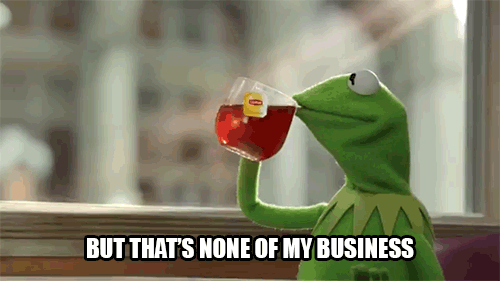
I'm just saying. Unfortunately, this utterly ridiculous trend exists in many fandom spaces. One of the greatest things about growing up is the opportunity to actively choose consuming content you like and control how you experience different things. No one can force you to see, hear or read things that upset you. Blaming people for creating content you don't like and upsetting your mental health with it (when you willingly decided to consume said content) is immature and foolish. It's not their problem.
You know how some children in primary school like to blame their parents or even pets when they didn't do homework or forgot it at home? Well, these complaints sound exactly like that.
"I decided to ignore all content warnings about potentially upsetting stuff and consumed your content anyway. Now I am traumatised, and it's your fault!"
What kind of reasoning is that, exactly? Most 8-year-olds are more mature than some people here.
Being an adult means taking responsibility for your actions.
Being an adult means taking responsibility for your mental health, triple-checking content warnings and staying away from stuff that upsets you. Accept that you are not the target audience, and this content wasn't made for you and move on. Both content and its creators aren't evil just because they created things you didn't like or things that upset you.
Being an adult means understanding that people have different tastes and opinions. Other people can wholeheartedly love things that you despise. These people don't owe you an explanation or reasons for their preferences.
So, please, for the love of everything above and below, grow up and own up to your decisions.
P.S. I have to point out that fan creators aren't obligated to put content warnings, rate, and tag their work properly) There are no legal consequences. There are no laws in most countries that demand this. It's a form of courtesy because some people care about the well-being of others.
5 notes
·
View notes
Text
Part 5 - Basic Concepts of Miraculous Ladybug: Guardians
Helloooo! Did you think I was done? No!
My PhD thesis chapters were approved last week, so have some celebratory meta. I haven't seen the latest Season 4 episodes, so do forgive me for not being up to date.
Welcome to the next part of my analysis of the basic concepts of Miraculous Ladybug. Today we are talking about Master Fu, Order of the Guardians and how little everything here makes sense. I highly recommend reading previous parts to fully understand this one, but I'll try to quote most parts of earlier posts.
Order of the Guardians
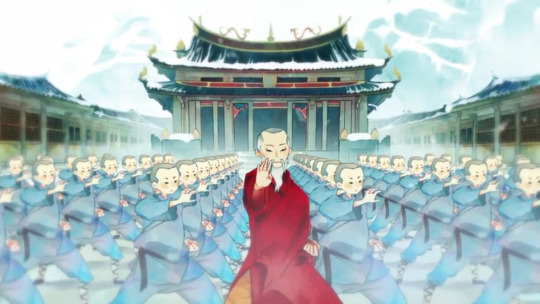
Order is an international and ancient organisation (New York Special showed us the guardian from North America and he was dressed like Su Han). Presumably, Miraculous jewels were created by these people. Guardians are responsible for the preservation of jewels and knowledge about them. They also distribute Miraculouses to worthy people around the world to combat mostly magical threats, but sometimes jewels are used against normal threats too. It's implied that Master Fu used Miraculouses during WW2 when he was in Paris. Perhaps he performed some spywork with Marianne, but the magical nature of his interferences was discovered and he was forced to flee, before returning to France many decades later.
Why does the Order need so many people to take care of a 3 Miracle Boxes? If its only purpose is to preserve knowledge, keep magical secrets and distribute Miraculous jewels then wouldn't it be more logical to have Master-Apprentice system? It's much easier to keep magic knowledge a secret and train a few people in martial arts than doing the same in the self-sufficient temple full of people, keeping in mind that a good part of them are teenagers and children, who are bad at keeping secrets. Also a single person can travel around the world much easier to give out Miraculouses. Imagine that we have a few active guardians traveling the world with Boxes. What do other people at the temple do in the meantime? They teach the next generation about the powers of each Miraculous and Mirakung Fu, but besides that?
Master-Apprentice system gives us more personal conflict between Fu and his mentor and makes his relationship with Marinette and Adrien more nuanced. In this scenario Fu accidentally caused the death of his Master at 14 because he wasn't careful. It makes sense for him to take on only 1 or 2 students if this is how things were done with Miraculous Guardians. This Wang Fu is very cautious and protective, he spent the majority of his life afraid of hurting someone else and never took an apprentice as a result. But now he is ready to try again, since he is not getting any younger and he likes these 2 kids. He wants them to succeed. Maybe Master Fu, becomes the father figure for Adrien in this situation and a guide for Marinette. Just think about it. This way writers avoid the need to develop all these extra characters (Su Han) and traditions related to the Order. All inconsistencies I mentioned before and later in this post are gone now! Hell, even memory loss and the changing of the Miracle Box shape could make more sense. We also raise the stakes post-amnesia, if it happens of course (the whole Season 3 finale didn't make sense, so stay tuned for my next meta). Marinette and Adrien are on their own now, there's no one who can give them answers. It's very fun scenario, which has potential to be brilliant. Any thoughts on that?
The existence of Order of the Guardians is not quite a secret, at least it wasn't in XIX century China. Master Fu in "Feast" says that guardianship was considered "a great honor". It implies that people who lived close to the temple of the Order knew about Miraculouses and what exactly guardians did for the greater good.
The existence of other Miracle Boxes around the world makes sense from a real-life perspective. Writers have the ability to create many stories set in the same universe and use them for merchandise and an almost unlimited amount of content. Judging by the unholy amount of specials in production, this is exactly what the creators are going to do. It probably won't go down well, but who knows?
However, it doesn't work in our main story. The main conflict is Paris-centred. Gabriel's motivations revolve around Emilie's resurrection and Season 4 gives us more reasons to suspect that Adrien's mom wasn't as wonderful as everyone says. Hawkmoth still remains the main villain of the show and most likely it's going to stay that way. There's no point in moving the main story to different places for the sake of introducing more Miracle Boxes from around the world. Ladybug and Chat Noir aren't needed to fight something halfway across the world unless Hawkmoth also changes locations.
LB and CN are centrepieces of this franchise. They brought success and money to ZAG. Creators constantly need to remind the audience that this new piece of media with new characters who will never be mentioned again is connected to Miraculous Tales of Ladybug and Chat Noir. Writers have to come up with reasons to include our heroic duo into the story even if makes no sense.
New York Special had to introduce American Heroes whose names rarely come up in the fandom because people stopped caring about them or their stories shortly after the release of the Special. I barely saw any content dedicated to them. In order to bring LB and CN into the story, you have to include Hawkmoth too. Gabriel suddenly needs to get his hands on the Eagle Miraculous and goes to USA. Marinette and Adrien suddenly have a class trip to New York. Unfortunately, their presence in this story is required only to expand the world of Miraculous and attract fans of the show, so that they could keep an eye on new content related to newly introduced characters.
In the end, it's not their story. Events of the special don't affect main story of the show and the development of the love square is merely an illusion, because Adrien and Marinette are no closer than before. In season 4 LB and CN are growing apart and their test of trust in NY Special doesn't matter. Perhaps, some people don't see it that way and it's their right, but I find it hard to see NYS as a valid contribution to canon. I mean, even people in large portion of the fandom state in the tags on AO3 that "specials are not canon", "specials didn't happen" or "ignores both specials". It speaks volumes about continuity and preferences of your fandom.
Shanghai Special didn't give us more information about the Order, which is located in China, history of Miraculous jewels. We still don't know much about how Gabriel and Emilie found Peacock and Butterfly. Maybe, Marinette's family had connections to Miraculous jewels. Maybe, Adrien does some snooping and discovers research his parents made while Gabriel is away. All of these are relevant to the main story. However, we got something much different in the end.
Marinette chases Adrien across the globe and they make new friends. Fey becomes Ladydragon and now has a direct contact with Marinette through her uncle. Gabriel's desire to get his hands on the Prodigious comes out of nowhere. Apparently, he had been planning this trip for years, presumably even before Adrien was born. It probably happened at the same time as Agrestes found 2 Miraculouses. He bought bracelet-key (which is also a Miraculous apparently, but its Kwami is a Guardian of the Prodigious and they existed separately for a very long time - and let us not dwell on this mess) from some shady mafia boss, who can easily find out just who Gabriel really is (fashion designer billionaire) and use this information to blackmail him. This Special didn't answer important questions, but it gave us a new superhero character.
The real question is whether Miraculous as a project will survive long enough for writers to create content for every minor character they introduced in all specials. This is only a beginning after all.
Miraculous is not a global show and it can't be globalised in a way that makes sense, at least with Ladybug and Chat Noir in the centre of action. Case closed.
Mirakung Fu
I liked the idea of Mirakung Fu introduced in "Furious Fu". It makes sense and things rarely do in this show. Miraculous grants its holder superhuman strength, stamina, endurance and ability to fight. This means that essentially transformed heroes are guided by magic in combat. There's nothing personal in the way Miraculous holders fight. You can predict their moves and learn how to fight this magic guidance, which is what Su Han does.
However, if the holder has any special training, skills or knows any martial art in their civilian life then they become more dangerous opponents during transformation because now their fighting is a mix of magical moves and their personal knowledge, tricks and style. Therefore, Adrien and Kagami as skilful fencers have more chances of winning against someone who knows Mirakung Fu than Marinette, for example.
Memory loss
At the end of season 3, we find out several things:
apparently, now Miracle Box can change appearance to suit its guardian;
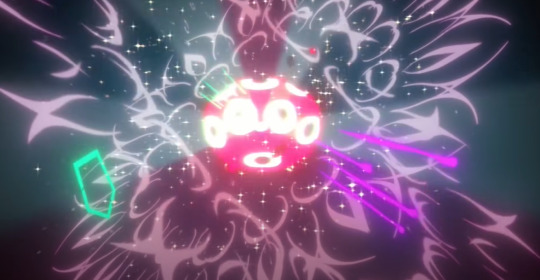
when Guardian passes down the Miracle Box to someone else, they lose memories not only about everything related to Miraculous, but also about pretty much everything in their life (Fu doesn't recognise Marianne, instead he experiences the love at first sight)
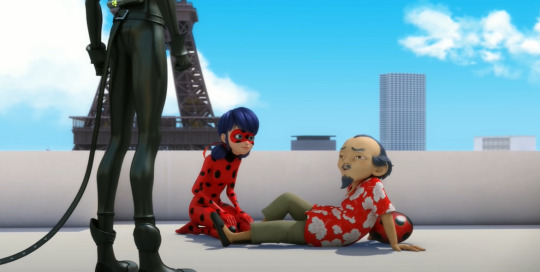
Master Fu trains Marinette to be the proper holder and next Guardian off-screen. He says that her training as the holder is complete in "Feast" and wants her to become the next Guardian. Fu told her lots of things, and yet, he never mentioned the fact that he would lose his memory after relinquishing the box, nor the fact that Marinette would lose her memory afterwards. She finds out about this from Wayzz after the battle with Miracle Queen and the letter that Master Fu gave her. That's not proper training! How on Earth do you forget to mention this memory loss? How?
Master Fu's amnesia is a convenient plot device that removes him from the narrative almost completely. That's mostly all there is to it. Why? Because it doesn't make sense.
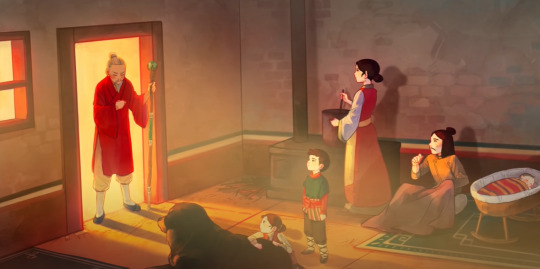
Fu was around 7 or 8 when he started his training. The disaster at the temple happened when he was 14. He stated that his training was never complete, which means that he never passed any magical ritual, never swore an oath or was bound by some kind of spell that made him subjected to the rule of memory loss.
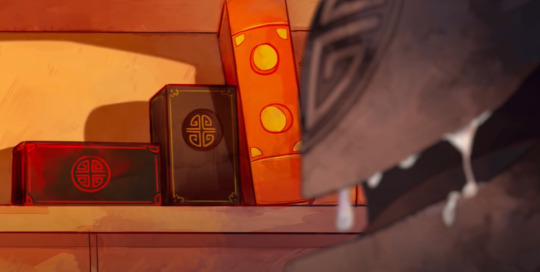
Miracle Boxes belonged to the order, not Fu. Their design reflected their country of origin because these Miraculous were made and kept in China. They were just standing there on the shelves not magically bound to anyone in particular. When Feast attacked, monks just tossed Wang Fu the miracle box and grimoire. No one at the temple lost their memory after Fu took the box with him (Su Han is the proof). Su Han not only remembers Fu and his mistake but everything that happened that fateful day as well. In "Furious Fu" Marinette explains Su Han that Master Fu lost his memory in the very first conversation they have. However, after Ladybug and Chat Noir fight Su Han on the roof and escape with the Miracle Box, the latter searches for Fu and attempts to take his staff from him. In this scene, Su Han acts like Fu knows very well what is going on and who he is.
Su Han should be aware of the memory loss rule as the Celestial Guardian. He remarks on the different shape of the Mother Miracle Box and calls her "incorrect", which means that Su Han should have been able to easily tell that previous Guardian lost his memory and the Miracle Box is now bound to someone else. But he doesn't say anything. Moreover, since Su Han is supposed to know about amnesia, he seemed awfully chill about forcing this 14-year-old girl in front of him to give up the box and her memories. Hell, Chat Noir wasn't on board with this. But we get zero reaction from Su Han.
During the first conversation between Marinette and Su Han, he doesn't ignore what she is trying to say, instead he actively comments on every word. Even if Su Han didn't listen when Marinette told him about Fu's memory loss, than he still should be able to understand that Fu doesn't recognise him, because of common sense and the "incorrect" shape of the box. But nothing of the sort happens. Because writers apparently forgot that "memory loss" is supposed to be known to everyone in the Order. On-screen it looks like Su Han is not aware of the "amnesia rule".
"Furious Fu" makes the concept of memory loss a plothole no matter how you look at it. Just like "Timetagger" and "Chat Blanc", as well as "Kwamibuster" this episode is not consistent within itself. It does not surprise me, however.
Grimoire and Guardian Staffs
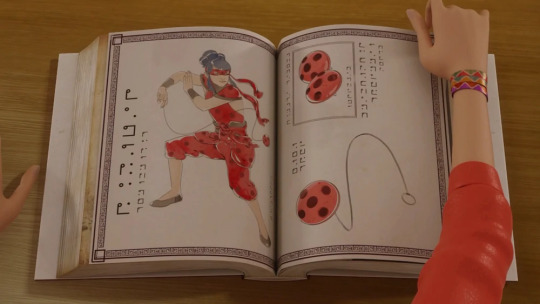
Let's talk about the Miraculous Grimoire. Good things first.
There are no illustrations of Miraculouses in camouflage. Kwami can't read its contents, only guardians can. Certain elements are written in riddles as an additional precaution. The book contains only the information people have learned so far, which means that Miraculouses have more unexplored potential ("Mr. Pigeon 72"). It describes powers of each Miraculous, provides information about weapons, has instructions for potions that don't make sense (see previous parts).
Unfortunately, everything is about to go downhill from here.
Guardians are taught how to read the writing in this book. They can read it just like people learn to read texts in a different language. This means that one can read Grimoire like any other book (you don't need to consult some guide to decode each letter or word). Master Fu proclaimed Marinette an almost fully trained Guardian. He should have taught her how to read the Grimoire then (he doesn't know the code very well, but he knew enough to understand the general meaning and content of the book according to "Collector"). He didn't. We don't know why. He shows her powers of every Miraculous but doesn't teach her the code.
Master Fu knows that Grimoire now belongs to Gabriel Agreste. He knows that it's dangerous for someone else to have it. If they knew how to read the Grimoire, they could discover all secrets of Miraculouses and harm Ladybug, Chat Noir and other heroes. It's very important to keep the information about the code top secret because Fu is not the only one with the source material.
What does he do then? Master Fu proceeds to write a French translation of Grimoire for Marinette, a translation that he doesn't even need. He carries it with him at all times on a tablet (without any precautions) just like the Miracle box after "Feast". Naturally, it means that in "Miracle Queen", Gabriel and Nathalie easily managed to get their hands on the tablet and Miracle Box. It allows the plot to happen, sure. But it doesn't make any sense.
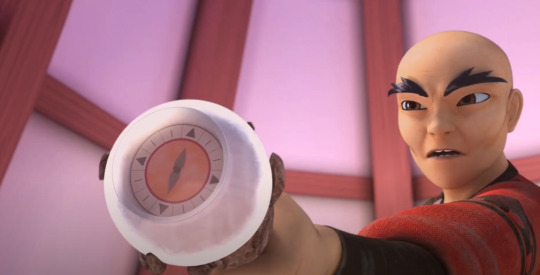
"Furious Fu" created another curious plot hole. It will probably be ignored, of course. Su Han has a staff with a magical compass that allows him to find any Miracle box, but not the Miraculous jewels for some reason. How does the staff work? Can it locate the box without the Miraculous? If yes, then it seems useless. What's the point in the ability to locate an empty box? If it can locate the box only with the Miraculous jewels inside, it implies that the staff can track the location of every Miraculous too. So, Su Han could just locate the Butterfly and Peacock without any problem. But he talks about reassigning Ladybug and Black Cat to adults and defeating Hawkmoth like locating the Butterfly is not possible. This situation makes the Guardian Staff a simple plot device that creates plot holes and its only purpose is to explain how Su Han found Marinette.
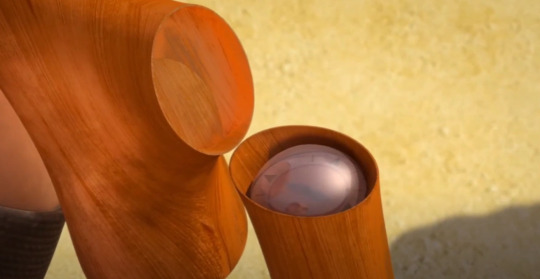
Also, I have a few more words to say about this. Master Fu had a Guardian Staff that was never mentioned before. I wonder why? That's because the staff didn't exist before "Furious Fu" was written. Writers just went: "Do you know what would be cool? If Fu's cane was really a secret Guardian Staff with a compass all along that he decided to keep even after he lost his memory? It would make people wonder whether Master Fu is faking amnesia, and everyone will definitely call him an awful mentor after this even though we kind of tried to make him a good and responsible person."
Fu didn't give it to Marinette and didn't mention it to her. Why? When he gave up his memory, he should have written about this in his letter at least. Why did he decide to keep it? He can't use it anyway now.
Please note how in the flashbacks Fu didn't take any staff with him when he escaped the temple. Su Han seemed to know how Fu's staff looked like. It means that Master Fu didn't make this staff himself, because it belonged to the Order.
Su Han wasn't even surprised that Marinette didn't have the staff as the current Guardian. Was she not supposed to have it? He never questioned the fact that the former Guardian without memories has the staff. Su Han actually returns this staff to Fu after he is deakumatized and Fu acts like they have never met before. Why did Su Han gave the staff back when he knows what it is and to whom it should belong (to him or to Marinette as the current Guardian)? The staff is useless in the hands of the civilian. Does Marianne know about its secret? We'll probably never find out, unfortunately.
Guardian Staff of Master Fu has a compass too and therefore this also makes it a plot device, just like Su Han's staff.
#miraculous ladybug#ml#miraculous analysis#miraculous meta#ml meta#ml analysis#miraculous critical#miraculous ladybug critical#miraculoustalesofladybugandcatnoir#mt of lb and cn#miraculous guardian#miraculous order of guardians#master fu#miraculous master fu#wang fu#miraculous su han
20 notes
·
View notes
Text
Part 4 - Basic Concepts of Miraculous Ladybug: Glamour
You can call it however you want: kid's show logic, superhero disguise logic, magical girl show logic, cartoon laws, suspension of disbelief, etc. But the fact that nobody recognises Marinette, Adrien and others when they are suited up IS NOT BAD WRITING. It's one of the main laws of this genre. That's not because characters are stupid, okay? So, being frustrated that everyone in the show acts stupid about this "wearing a mask that covers only eyes" trope is strange. This criticism is not valid or fair.
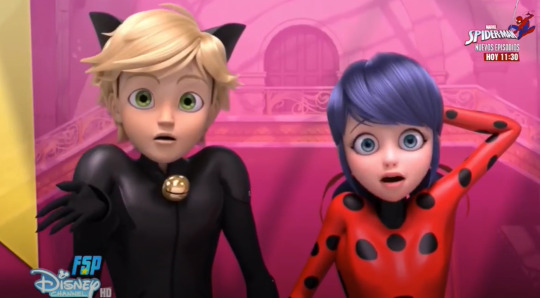
But, this trope has to make sense in-universe as a worldbuilding and narrative element.
Miraculous doesn't give us much direct information on how glamour works. And in this case, I think we need both SHOW and TELL. Because if you don't establish the glamour rules clearly, you are going to run into problems and create unfortunate implications with your storytelling choices.
Appearance
Miraculous obviously gives our heroes magical glamour. In "Lady WiFi" we find out that masks can't be taken off. It's magic. No other explanation is needed.
Miraculous can slightly change the appearance of users (eyes, face shape, height and hairstyles). People can identify and notice the hairstyles of heroes (numerous Ladybug wigs, statue in Copycat). Jagged Stone points out the change of hair when he mistakes Chloe for Ladybug ("Antibug"). But it's just a costume. There is no magic that prevents Jagged from understanding that Chloe isn't Ladybug. So, how does it work? But it's forgivable because it's cartoon logic. Suspension of disbelief works here, I suppose. I won't judge this too harshly.
Glamour also obviously prevents people from making a connection that Marinette and Ladybug have identical hairstyles. So people know that Ladybug wears her hair in pigtails, but magic does not allow them to notice similarities.
Another important question. Does glamour work on Kwamis? Can they see who is behind the mask?
New York Special makes it clear that magic does not affect robots and they can see through glamour. Does that mean that Markov, AI built by Max, knows the identities of Ladybug and Chat Noir? And it's never addressed.
Plagg in "Frightningale" says that holders can subconsciously choose their superhero appearance. This is actually pretty interesting and I like this idea a lot. Except the show is not consistent with this. The transformation of Master Fu looks identical to Nathalie's. And we have seen how different from each other Ladybug and Black Cat holders looked in the past. At the same time, Master Fu and Nino have different takes on Turtle superhero suit.
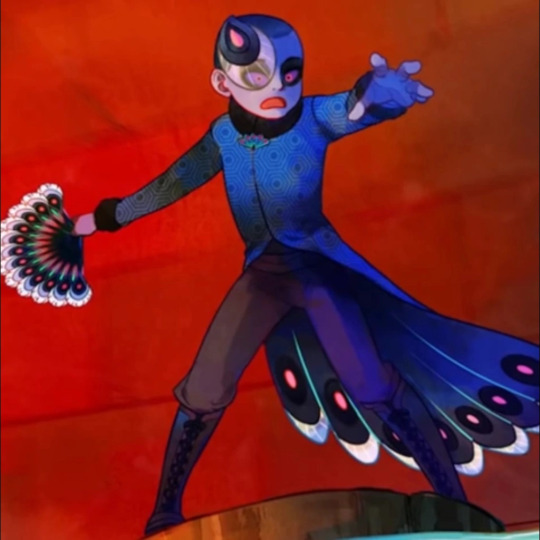

Age Glamour
Does age glamour exist? Do people see Ladybug, Chat Noir and other heroes as adults even when they look like teenagers to the audience (their height and build are smaller even when they are transformed)? Is that why no one ever questions the fact that children nearly die on a daily basis?
I mentioned unfortunate implications earlier. Well, this is where they come into play. Let's talk about "Copycat". A lot of people discussed it before me, so I won't bore you with details.

When I watched "Copycat" for the first time Theo's crush on Ladybug didn't bother me, because I thought that he sees Ladybug as his peer, a girl who is about 20-23 years old. Theo is an artist, his character design is that of an adult. He has his own studio, its appearance indicates that he did serious commissions in the past. The guy has no idea that Ladybug is like 13.
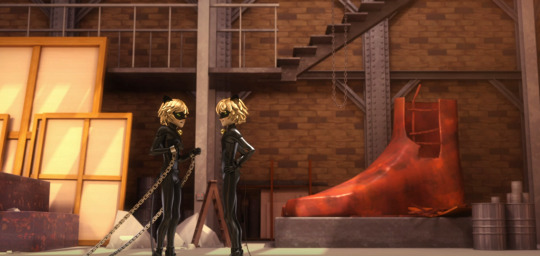
But then we get "Heroes' Day" and "Ladybug". And Hawkmoth calls them "kids", which means that there is no age glamour. Others see Ladybug and Chat Noir as teenagers. Perhaps, other Miraculous users aren't affected by age glamour. Therefore regular people see all heroes as adults but other heroes are able to guess their age more or less correctly. But you must spell this thing out because the audience can interpret "Copycat" differently. If there is no age glamour, then Theo is crushing on a teenage girl and he is fully aware of this fact. And this doesn't look good for your show.
The "No Age Glamour" theory is further confirmed in "Sapotis" where Alya just straight up analyses voice recordings and says that Ladybug is a girl their age. If glamour exists then it should also cover technology. Kwami can't be photographed. Face and voice recognition software shouldn't be able to analyse transformed superheroes and detect their identities in any way.
Besides, after "Sapotis" Alya should definitely be sure that Ladybug is not 5000 years old (also not an adult), especially after she wore Miraculous herself and was one door away from detransformed Ladybug.
SEASON 4 UPDATE! There's no age glamour after all.
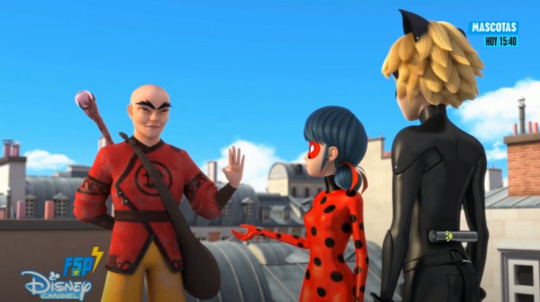
In "Furious Fu" Su Han calls Chat Noir a child without knowing his identity. It means that everyone knows their superheroes are teenagers. "Copycat" can't be saved from that, uh, subtext anymore. No one questions the danger of their job or the balance of their lives outside of the mask. No one doubts their competence after "Origins" ever again. No one becomes annoyed after being bossed around by two teenagers in spandex. You had many opportunities to drop these details into the narrative. Someone could have been akumatized over this (I will not be ordered around by some magical kids!).
I don't know why writers decided not to use at least this idea and slightly adjust "Copycat" if they got rid of the age glamour completely. It can be explained as kid's show logic, but unfortunately, I'm reluctant to do it. If many characters sympathise with akuma victims on-screen, why not with the teenage superheroes who must fight them?
New York Special had this weird focus on collateral damage out of nowhere (the damage done by sentimonster Robostus) and yet it has 0 effect on the main story. No one in Paris is pissed that their 2 teenage protectors weren't there.
Ironically, "Furious Fu" and that one remark made by Su Han also created unfortunate implications for other moments in the show. Just hear me out. Apparently, Jagged Stone wrote a "thank you" song for Ladybug knowing that she is 13-15 year old child back in "Pixelator". Fandom is more than happy to roast Lila for lying about saving Jagged Stone's cat and him writing her a "thank you" song. Fandom claims that Lila's tale could harm Jagged's reputation, when he wrote a song for teenage Ladybug several weeks prior. Meanwhile, in-universe this lie is 100% believable.
If we put on "realism glasses", then both this whole song situation and Theo's crush in "Copycat" have uncomfortable implications. However, the show's canon can't be viewed and criticised through "realism glasses". I admit that bits and pieces of my criticisms are affected by these "glasses", but, ultimately, I'm trying to be fair and concentrate only on things that can't be justified by "cartoon logic and worldbuilding".
Could the existence of age glamour solve this problem of unfortunate implications and other concerns mentioned above? YES. Is it better for the narrative? YES. Is essential for the story? NOT QUITE. Could the absence of age glamour be called an irredeemable storytelling flaw? NO.
Disclaimer: On a side note, only older audience can notice these implications. Children, the target audience, most likely won't understand this subtext simply because they don't have enough experience. So, perhaps, this criticism is unfair, because these moments only look weird to me as an adult. It's like an adult joke in a cartoon that you don't get until you reach a certain age.
There's nothing technically wrong with adult writing a "thank you" song for a teenager. It's just an expression of gratitude. However, unfortunately, we live in a world, where adults normally wouldn't write songs for teens to express gratitude only. In real life similar actions would imply pedophilia and would be actively scorned by the public. No one would risk their reputation like that even if their intentions were genuinely pure and sincere. But this show can't be viewed through "realism glasses", because it's a cartoon and in certain cases we as the audience must use suspension of disbelief and pretend that certain things are possible for plot to happen.
Su Han also wants to give Ladybug and Black Cat to adults. Why didn't Master Fu do this then? Writers don't give us any explanation. Throughout the show we never question this up until the moment it's revealed that adults don't have time-limited powers. Then comes "Furious Fu". Story suddenly becomes self-aware here. Because apparently nothing prevented Fu from giving the most powerful Miraculous to adults who won't have time limit and will be more effective against Hawkmoth (see part 3 for more details).
I have a very good example of Age Glamour done right. It works in the story. There is no confusion or unfortunate implications. There is like one plothole connected to the glamour (it's been years and I still can't forgive them for Cornelia and Caleb) but otherwise, it's a pretty solid example of both show and tell. Clearly, writers wanted to avoid uncomfortable implications which are present in "Copycat". I am talking about W.I.T.C.H. comic books and animated series.
If you are not familiar with it, I'll give you a brief explanation. The story follows 5 girls, the Guardians of Kandrakar who are chosen to protect their world and parallel ones from evil. They receive magical powers from the amulet known as the Heart of Kandrakar. Their powers are based on elements: fire, water, earth, air and energy. Our main characters are about 13-15 years old. In the animated series they are younger and they attend middle school, making them 12-14 years old. But the transformation makes them look 18-20. They look like young women to each other and to other people. At the same time, people can recognise them, their looks and voice don't change. Most people don't know that they are really teenagers when they are not transformed and these people don't know that magic can make them look older. That's why everyone treats Guardians like adults when they are transformed. Comics establish this fact in the very beginning. In first issues characters state that they look older, we are also shown this multiple times.

In fact, one of the first side plots revolves around the fact that Irma uses her powers to sneak into the disco club to meet up with her crush. Irma is 13 at the beginning of the series, she is a high school freshman. Her crush, Andrew Hornby is a senior guy 17-18 years old. Irma has liked him for a long time and wants to impress him, so she decides to be clever about this. She transforms into her Guardian form of the 18-year-old girl, hides her wings, sneaks out to the club after her parents are asleep without any problem, and meets Andrew, who obviously doesn't recognise Irma in this girl who looks about his age. Smitten Andrew offers her a ride and 13-year-old Irma doesn't understand the implication of that offer, so she accepts. And, obviously, he decides that she is interested in more than just a ride home, since she agreed, and the comic implies that he fully intended for them to have sex in the backseat of his car. But Irma understands the implication only when Andrew tries to kiss her. She panics and turns him into a frog. And she actually pulls this "I need to look mature" trick more than once over the course of the series.
It's not the only situation where this age difference is handled well and makes sense. People who know the main characters in everyday life remark on their older appearance during transformation. Sometimes people flirt with Guardians when they are transformed. In one of the side-novels centred around Cornelia, she is worried that the prince of the realm they helped to save from famine would try to marry her. That never happens, but Cornelia actually brainstorms with her friends about how to tell the prince that she is really 15.
There are many other plot points where this happens, but I think that you got the idea. I really like how "Age Glamour" was handled in W.I.T.C.H.
How do we fix this? Create the situations where people offhandedly mention "Age Glamour" in the presence of Marinette or Adrien, use Kwami for this.
"Don't worry, dear. Chat Noir and Ladybug are adults, who know what they are doing. I am sure that they will handle this. "
Theo could say: "Oh, I wonder which university Ladybug goes to?"
"So, does that mean that other people see us as grown-ups, Tikki?"
A few words and boom, problem solved. Then allow the "show don't tell" rule do the rest.
#miraculous ladybug#ml#miraculous analysis#miraculous meta#ml meta#ml analysis#miraculous transformations#miraculous critical#miraculous ladybug critical#miraculous glamour#superhero glamour#miraculoustalesofladybugandcatnoir
64 notes
·
View notes
Text
Part 3 - Basic Concepts of Miraculous Ladybug: Transformations, Potions and Power-Up's
Welcome to my analysis of basic concepts in Miraculous. Let's talk about transformations, potions and power-up's. This one is going to be interesting.
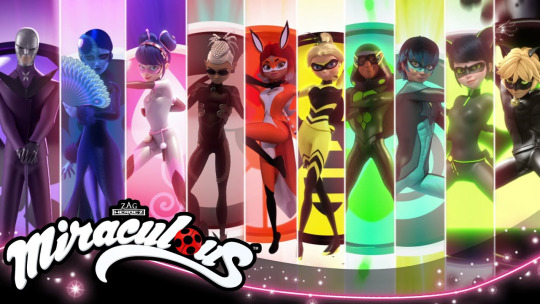
Apparently, only child superheroes have a time limit and can use their power only once. And adults can use their powers many times and maintain their transformation.
I don't take Thomas Astruc's Twitter statements seriously, but he said that adults don't have to detransform because they can feed the kwami with their energy. What happens when energy runs out? Does it mean that holder of the miraculous dies and transformation drops? Or does transformation drops when the kwami grows tired enough? However, according to "Silencer", transformation can't be released until the holder says detransformation words or uses their power (applies to children only). Is that why Master Fu doesn't transform these days? Because he is old and doesn't have enough energy for Wayzz.
At the same time, Bunnix/Bunnyx held her transformation for several thousand years in "Timetagger" and she was still alive. Moreover, not only she was still alive, she hasn't aged a day. Alix still looked around 25 even after spending so much time in stone. Her sanity was also still intact. Does that mean that as long as people are transformed they are immortal and can't die of natural causes, can't get sick or be killed? Does the Miraculous pause all inner processes? Do people stop ageing when they are transformed? Does that mean that prolonged transformations essentially slowed down puberty for Marinette and Adrien because every Akuma attack (their transformation during this attack to be precise) acts as a pause for their growth process? Does that mean that transformed heroes don't need food, sleep or oxygen? And Alix doesn't experience any negative side-effects after prolonged transformation. A lot of questions must be answered here.
But apparently, the "adults can use their power many times without detransforming" rule does not apply to Gabriel. In "Heroes' Day" he turns Nathalie into Catalyst who gives Hawkmoth the power to "release as many akumas as he desires". Does that mean that he can't normally do it? On the other hand, in "Queen Banana" he creates another Akuma right after the fight with akumatized Chloe ended.
Do you remember this? In "Origins" we find out that akumatized butterflies can multiply. That's why Ladybug needs to purify them. So, does that mean that Scarlet Moth and Catalyst weren't necessary?
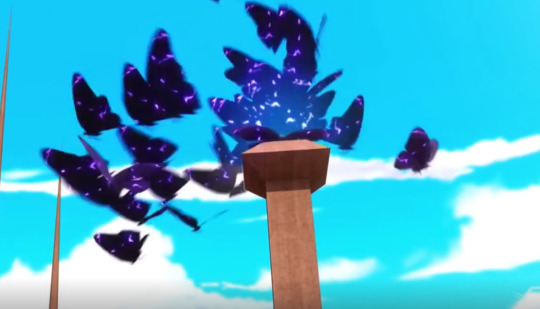
Hawkmoth's plan in "Heroes' Day" was actually very smart. However, it can fall apart when you remember that butterflies can multiply. How does that work? Why do they multiply? Could Gabriel akumatize Nathalie into Catalyst (akumatized object is something not very valuable, like a piece of paper), then break the akumatized object and release the Akuma into the world? Would that turn people only into copies of Catalyst? I wouldn't call this thing a plothole, exactly. I'm just curious because it's an unclear moment. Perhaps you could explain it as the element of a soft magic system with unclear rules. Because the magic system in Miraculous is a mix between the hard and soft system.
Adults without time-limited power have a serious advantage over children. Why does Master Fu give Ladybug and Black Cat to teenagers then? In the beginning, Fu doesn't know that Butterfly holder is an adult. Isn't it safer to give 2 most powerful Miraculouses to adults just in case? If Butterfly Holder is a child then 2 adults with more powerful Miraculous would win much faster. If Butterfly Holder is an adult as well, then the fight is more even.
We know the out-of-universe reason for doing this. There would be no story then. Miraculous holders have to be kids since it's a kids show. But in-universe it doesn't make sense. In "Furious Fu" Su Han even says that children are not allowed to handle the Miraculous at all according to the rules of the Order. Fu knows that children have a time limit. It looks like he deliberately sets them up for failure. Why?
Is that because children are easier to manipulate as they are most likely to trust Fu's judgement no questions asked? This reasoning doesn't look good for Fu, who is supposed to be a wise and kind mentor. Is that because children won't abuse their powers? Find a trustworthy adult then. Give us some kind of in-universe explanation!
If you can't explain it then do something with the time-limit rule. It's an important plot device, which contributes to tension and raises the stakes during fights. So, removing it is unwise. Consider giving adults a time limit as well then.
Or you can create different rules. Maybe Black Cat and Ladybug can't be wielded by adults, unlike other lower-tier Miraculous? Maybe Miraculous and Kwami can choose the wielder in some capacity, and this magical bond can't be changed? Do Kwamis feel a pull towards several people and Guardian then chooses the final holder? If there's no pull whatsoever, then Kwami won't be able to grant powers to this person? How much weight does the decision of a Guardian have?
I actually like this last idea the most. It makes sense and avoids plotholes at the same time preserving the time-limit rule. I spent less than 20 minutes figuring this out.
This way Fu gave Ladybug and Black Cat to children because he didn't have a choice. Plagg and Tikki gave him suggestions but these people didn't pass his tests. Marinette and Adrien are the last ones and they do pass. It adds some tension and showcases desperation on Master Fu's part. Magical pull doesn't always mean that potential holders are good people. That's why Miraculous sometimes end up in the wrong hands.
Insert a conversation between Marinette and Tikki or Plagg and Adrien about this choosing process, have them wonder about the bond Nooroo and Hawkmoth share.
Then add more information about bonding. The magical connection can be formed just like people form relationships if human and Kwami spend some time together. It nicely adds up with the reason why Master Fu gave Ladybug and Black Cat to teenagers. He could have given both jewels to adults without a bond and waited for the connection to form but alas, there was no time. He needed active holders right now, and waiting for some adult to come around wasn't an option. But here's the catch. Only decent, kind people with good intentions can earn and create a magical bond. And this has the potential for a truly delicious scenario (more on that later).
It's a very tricky situation. But these rules must be stated and figured out in the very beginning. Because it can create plotholes down the line.
Unification
Combining several different Miraculous is an interesting concept and fusion of powers has been used for a long time as a storytelling element. It's important for the plot in several episodes of seasons 3 and 4.
However, there's "Kwamibuster", where the worldbuilding is broken one more time. It is awfully inconsistent within itself just like "Chat Blanc", "Timetagger" and "Furious Fu". (How do writers keep doing this? I have no idea. But then again even "Avengers: Endgame" contradicts itself numerous times. It's truly miraculous how they managed to do this with their budget, I'm impressed).
For a moment let's ignore all absolutely awful priorities that Marinette has in this episode as well as the rule "you can't know the identity of your partner or else you will have to give up your miraculous". This rule is literally never mentioned again before or after this episode. It's just there and it doesn't make sense. I know it's hard to ignore, but one must try. Instead, let's focus on this dialogue below.

Master Fu clearly states that you can't merge the Miraculous. It could make you lose your mind. The only more or less acceptable unification is that of Ladybug and Black Cat.
What happens next? Marinette puts on every Miraculous without any problem just "to free Kwamis" and transforms into Multimouse. The only sign of her discomfort is a moment of dizziness that's gone in a few seconds. Moreover, it never happens again, it's never mentioned. Then she does the exact thing that Fu told her not to do and starts merging Miraculous left and right. She continues to do so in season 4 every other day. What? Of course, how could I forget Shadowmoth? Gabriel merges 2 Miraculous every time in season 4. He doesn't lose his mind.
You can't tell us that merging can make you lose your mind and then in the next scene show us the complete opposite. That's bad writing. If you need the concept of unification to work then cancel the "lose your mind" rule and instead say that the merging process tires you out. There's no lasting harm, just that you will be very tired. If you want to raise the stakes, then say that wielding more than one Miraculous requires a strong will and practice. It's possible, but you can't perform unification just like that.
In this case, you lay the groundwork for the plotline of Marinette and Adrien for season 4 and 5. This plotline is about mastering unification. Show us how our heroes practice with different combinations of Miraculouses outside of Akuma battles. Show how they are improving. Maybe, Ladybug and Chat Noir nearly lose in the season 3 finale because the unification still drains them. However, in season 4 they put more effort into their training and by the time season 5 rolls around they are good at this. They became a stronger team and partners because of that. Their training sessions are also a good set-up for the development of the love square. Nothing like this will happen, but a girl can dream.
Look, I get it. You want Marinette to be special. Unfortunately, you have made her too special. She starts to break the laws of your magic system. We don't see the process. One moment she has 0 knowledge about something and then she is already an accomplished master of the thing in question and often it happens in the same episode. Marinette somehow just knows about the properties of every Miraculous on-screen, but her training happened off-screen. We as the audience are left confused and wondering. Wait, how does she know this? Was there a missing episode? Was this mentioned in some comic? The audience keenly feels the lack of plot-relevant content and explanations.
Potions and Power-Ups
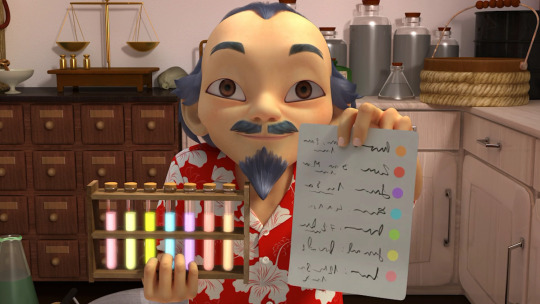
They are a marketing ploy to sell more toys and merch with character transformations. That's it. Are they useful for the story? Yes, they are sometimes. Do power-up's make sense as a worldbuilding element? I'm sorry to tell you this, but no.
Miraculous Grimoire contains lots of potion recipes for Kwamis. I liked that Kwamis can't read the grimoire to avoid giving information to malevolent holders, which implies that they can't lie to their holder about their powers. I talked about this in my previous posts.
Let's start with Ice Transformation. Apparently, in-universe its only useful characteristic and the thing that sets it apart from normal transformation is skates. Maybe, this transformation also has additional protection from the cold. Maybe. Miraculous makes heroes nearly invulnerable and enhances their physical abilities. I find it hard to believe that protection from elements is not included in the package. And that's it. If we remember that Miraculous holders have subconscious control over transformation's appearance, we can also assume that a person can have conscious control as well. The laws of the magic system in Miraculous allow Marinette to ask Tikki to create skates for this particular transformation. Potions aren't necessary for this. This way you can still sell new toy, but in-universe this works better.
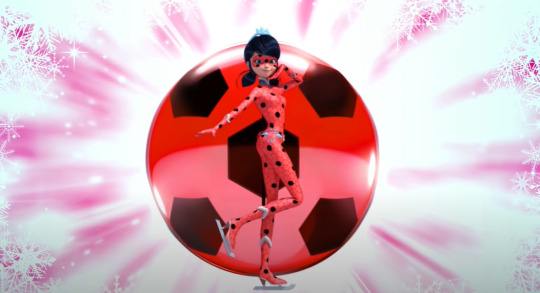
Our next stop is Aqua Transformation. It gives heroes the ability to breathe underwater and fins. That's all. In "Syren" it appears that this transformation also makes them more agile and fast in the water. However, Ladybug's yo-yo worked just fine before Aqua form when she tried to drag Kim to the surface. Her movements underwater weren't restricted either with normal transformation. So their fighting ability is not affected by the potion.
Kwami can live without oxygen. I mentioned earlier that Bunnix with normal transformation in "Timetagger" spent several thousand years in stone without oxygen and probably in some kind of stasis. Do transformed heroes need oxygen? No. Then their inability to breathe underwater doesn't make sense. Therefore, a potion isn't necessary for this.
Next, let's talk about fins. They could appear through the conscious desire of the holder just like skates.
Honestly, "Timetagger" and "Chat Blanc" completely destroyed worldbuilding in Miraculous. These episodes just shouldn't exist. They aren't even consistent within themselves, nevermind the rest of the show, which is why I still don't understand why fandom has such a weird hard-on for them and for Bunnix. Oh, wait. On second thought, I get it. They were just fanservice after all.
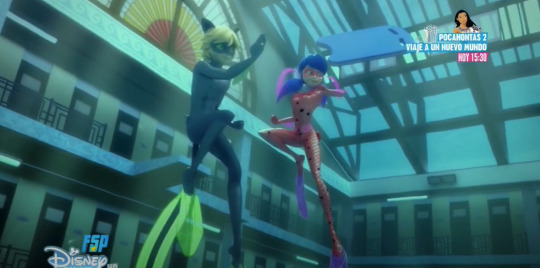
Cosmo Bug an Astro Chat. Space power-up give heroes the ability to fly and exist without oxygen. Ancient grimoire had the recipe of space potion, apparently. And humans got into space in the second half of the 20-th century. Ok. That totally makes sense.
If ancient people invented a space potion, that could also mean that back in Ancient Egypt Ladybug and Black Cat holders could use advanced technology. But Su Han in "Furious Fu" is surprised to discover that Ladybug can just call Chat Noir. He assumed she would send a bird with a message. That means that unconscious control over transformation extends to the weapons of heroes. For Marinette and Adrien communication means smartphone with navigation, messages, trackers and Bluetooth earbuds. That's why magic gives them smart weapons. Su Han's words prove that the invention of the space potion is not possible. Unless space potion was also subjected to unconscious control over transformation. People couldn't imagine the possibility of space travel in Ancient Egypt, but they could imagine flight. So, perhaps, for heroes back then space potion simply meant wings.
We've established that heroes don't need oxygen. So, a potion isn't necessary for this. The ability to fly also could be achieved through conscious transformation.
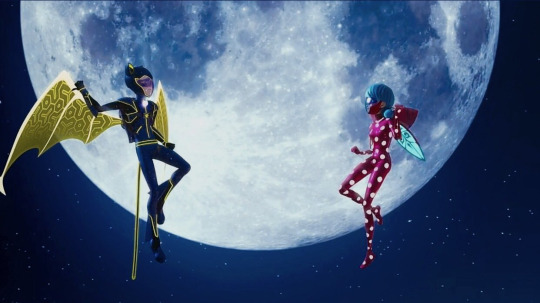
That's all for this part of analysis. Let me know what you think. Stay tuned for the next meta. See you!
#miraculous ladybug#ml#miraculous analysis#miraculous meta#ml meta#ml analysis#miraculous transformations#miraculous critical#miraculous ladybug critical#miraculoustalesofladybugandcatnoir#mt of lb and cn#miraculous potions#astro chat#cosmo bug
40 notes
·
View notes
Text
Part 2 - Basic Concepts of Miraculous Ladybug: Kwami
Kwamis are a fun concept and one of the main draws of the series. They make sense story-wise because, firstly, our characters need some support system. And since a lot of conflicts are centred around secret identities, characters should be able to discuss their double life with someone. As magical beings they could also be used to expand the lore, introduce new concepts and drive forward both the plot and character development. It doesn't always happen but Kwamis are a good idea. Some people who write AU's think that Kwamis are redundant, but I have to disagree.
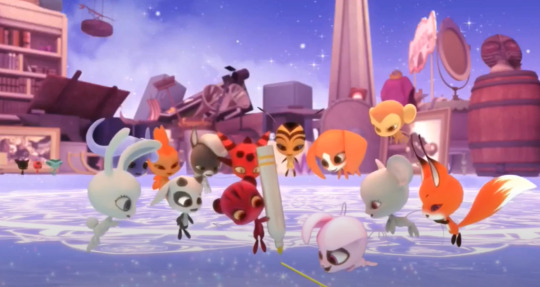
Origins and nature
Where do Kwamis come from? What are they? It's never explained. Oh wait, it was explained in a comic people can accidentally find. You decide to explain the origins and nature of magical beings who are one of the key elements in your magic system and worldbuilding IN A SIDE COMIC, which has zero effect on your main story. Sounds legit.
Here it is.

So, Kwamis are abstract creatures. They can become tangible and interact with the world because of the miraculous jewels. Essentially, each Miraculous acts as an anchor to the material world for Kwami. They existed since the beginning of time and were invisible observers of the universe. Until they settled on Earth and observed how humanity came to be. This is where things get interesting.
Kwamis are the embodiment of abstract concepts. But, some abstract concepts were created by people (like everything mentioned in the comic: beauty, math, love, etc).
Kwamis wanted to help humans. And then, a human, who couldn't see, hear or touch a Kwami creates miraculous jewels. And now these beings can interact with the world, use their powers and grant them to humans. Yet, they are completely under control of their holder. I'll discuss it later, but why did Kwamis accept this deal? They are practically enslaved. At the same time they care about people and generally love humanity.
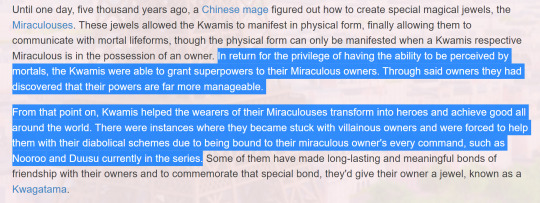
According to the wiki Kwamis grant powers because of "the privilege of having the ability to be perceived by mortals". What? Did I read that right? Kwamis agreed to be enslaved and used as a power source, because they wanted to interact with material world. That's it, guys, end of the story.
We also know these things about nature and abilities of Kwamis from the show:
1) need food, but only to provide the power for the holder;
2) can't phase through precious metals (Chloe's bracelet in "Rogercop"), their own miraculous and humans;
3) they can control if they phase through things or not – meaning that if they want to, they can (this way Tikki can stay in Marinette’s purse without much trouble and Plagg sleeps on Adrien’s pillow);
4) they can perform magic without a holder but they don’t control it very well, there are certain types of things that they can’t do without a holder;
5) they are immortal but can get sick for some reason, a non-magical reason mind you;
6) technology can't detect them in any way, you can't film, photograph or record their voices (writers establish this many times, but promptly forget all about their own rules in "Optigami", where Marinette talks with Kwamis over the phone without any problems).
If I missed something important, then let me know.
Look, the questions related to origins and motivations of Kwamis might not be very prominent in your story right now, but you must answer them in case you might need to involve these facts in the plot down the line. It's important to avoid contradictions in the serialised story with liquid plot, that can't be set in stone. It's a made up world for the sake of everything sacred! You can make up explanations and rules, of course as long as they don't contradict common sense.
Plausible ideas for origins and nature of Kwamis:
1) Kwamis are immortal spirits, whom humans accidentally summoned and bound with spells to Miraculous stones. They remember their existence before this. This version doesn't really explain their desire to serve people and love for humanity, however. It would be more logical for Kwamis to resent people for enslaving them. It doesn't explain how humans could create those spells and Miraculous stones either.
2) Kwamis are physical manifestations of abstract concepts who existed simply as fragments of matter for a very long time without sentience, until they were accidentally summoned through the Miraculous stones and bound by humans to serve them. Kwamis do not remember their existence before Miraculous. In this version Kwamis serve humans and love them because they have never known a different kind of existence. Unfortunately, it doesn't provide any explanation on the creation of Miraculous and spells.
3) Kwamis are gods, who created the universe with all its elements and concepts including humanity (similar to Valar and Maiar in Tolkien's Legendarium). They wanted to help their creations but discovered that their power was too wild and unpredictable for that. So, Kwamis decided to give up their free will and magical independence to help humanity. Together they created Miraculous stones for humans to use and sealed themselves inside. Kwamis as gods were abstract concepts, who didn't have a body. The act of sealing their power in the Miraculous gave them an opportunity to interact with outside world (an anchor) and each Kwami chose an small animal form (because humans easily formed bonds with animals, had animal companions (pets), small animals look non-threatening and familiar). Kwamis intentionally choose certain animal forms to suit the human symbolism. Humans later used magic that Kwamis discovered for them to place spells upon small gods (spells related to identity protection and so on). This version answers most questions, but if Kwamis are gods then powers they grant to people seem to be rather small.
Feel free to add more. I would be interested to hear your ideas.
Identity Protection
In "Origins" we learn that Wayzz can sense the aura of Butterfly Miraculous, a negative aura of activated Butterfly Miraculous, to be more precise. And yet, Tikki and Plagg are genuinely surprised to discover the identities of their holders in "Dark Owl". There are several things wrong with that.
Can Kwamis sense each other's presence? They shouldn't be able to do this to protect the identities of their holders. On the other hand, they are ancient spirits. So, their inability to sense each other seems weird. Unless it's the same situation as with the spell that does not allow them to speak the name of their holder aloud.
But if they can sense each other like Wayzz did, then it means that Plagg and Nooroo were living in the same house for over a year and nothing happened. I mean, Plagg could have just come upstairs, take off the brooch from Gabriel, while he is asleep and return it back to Fu.
This question lies right here, on the surface. And that's only one massive and very obvious plothole. How to fix it? Establish that Kwami can't sense each other for identity protection. In "Origins" Fu meditates on his balcony and Wayzz sees a charged Akuma flying by. That's how they discover that Butterfly is in Paris and the Miraculous is in the wrong hands. Perhaps, Gabriel akumatizes someone for the first time to survey the surroundings and general public is not aware of this. This works better in the narrative, giving Fu time to select holders for Ladybug and Black Cat. It also establishes whether Hawkmoth can remove the Akuma from someone without Ladybug and discharge it. Maybe it depends on the circumstances (sometimes he can, but if this person was akumatized many times or their emotions are too strong and their mind doesn't want to let Akuma go then Hawkmoth can't pull the butterfly out with his magic). This scenario allows for Volpina to happen on "Heroes' Day". Silly recurring Akumas like Gigantitan and Mr. Pigeon could still happen. In this case Gabriel didn't want to akumatize the guy more than 70 times on purpose. It just keeps happening against his better judgement because evil butterflies are automatically attracted to Mr. Ramier. This way repeated attacks of Mr. Pigeon annoy Hawkmoth just as much as they do the heroic duo of Paris (I did not sign up for this Nathalie!).
Let's come back to the spell mentioned earlier for a moment. Kwamis can't say the name of their current holder out loud, but apparently, they can exploit a loophole in the spell by confirming the identity of their holder in another way. The spell doesn't work with other holders. Kwami can say the names of other holders if they know their identity. That being said, can the holder order the Kwami to tell them the identities of other heroes if they know them?
Kwamis know how each Miraculous looks with or without camouflage. Can the holder order the Kwami to tell them how each Miraculous looks in disguise (I liked that Grimoire doesn't have pictures of camouflage for identity protection)? Guardians can recognise Miraculous in any mode (Su Han). Did Fu teach Marinette this? Does she know how each Miraculous looks like unactivated?
Oh! Since we are discussing camouflage, let's take a moment to appreciate the Mother Of All Plotholes. Plagg didn't recognise Peacock because of the plot.
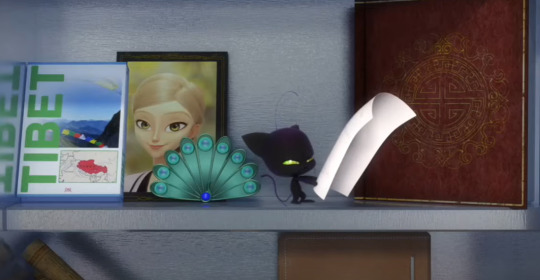
Relationship with Holder
I absolutely loved the idea that Kwamis must obey their holder introduced in "Sandboy". This concept opens tons of plot opportunities. It's such a great idea that makes sense, has potential, can create conflict. Why, oh, why didn't writers develop it more?
Like, it was so good. It can be a great push for character development. This concept resolves so many existing inconsistencies within the plot. It's mind-blowing.
Why can't Nooroo simply leave Gabriel, so that he wouldn't be able to transform? Because Gabriel bound him with Miraculous to always stay near.
In "Sandboy" Tikki asks Marinette's permission before going to the meeting. Plagg lies to Adrien instead. This implies that usually Plagg's holders weren't kind to him or feared his power (Su Han's remark in "Furious Fu"). Perhaps, his holders were taught to keep the Kwami of destruction under constant control. So, Plagg in turn has learned not to ask, because if he doesn't ask permission then his holder can't deny him freedom with magic.
Can Kwami lie to their holder? Maybe they can't lie to their holder about their nature, origins and powers and other Miraculous (but Kwamis can't reveal the location of Miracle Box, Guardian's identity and can't confirm identities of other holders known to them in any way). Kwami would be forced to speak even if they don't want to. That's why Nooroo told Gabriel everything about the abilities of the Butterfly Miraculous and the wish secret of Ladybug and Black Cat.
But Kwamis can lie to their holder according to Plagg in "Sandboy". If Kwamis can lie about everything (including powers) then Nooroo didn't have any reason to be honest with Gabriel way back in "Origins".
Speaking of Gabriel and Nooroo. Can Kwamis harm their holder? Maybe doing so would harm the Kwami as well. Can they do it only when the holder is not wearing the Miraculous? Can Kwami take their Miraculous from their holder? Will they disappear if they try to do so? It seems like Kwami disappears only when the holder takes off the Miraculous with the intention of renouncing power, the words "I renounce you" are not necessary.
Other Kwamis can take the Miraculous from people if it's not their own (Wayzz in "Feast"). But what if it wasn't possible. Imagine what could happen if it's not possible to take the Miraculous by force from the transformed or untransformed hero. Just like Lady WiFi couldn't remove Ladybug's mask. A person has to willingly give up the Miraculous. Only in this case, it's possible to take it. For example, somewhere around the middle of season 3 Hawkmoth could have trapped Ladybug and Chat Noir and cut off any escape routes. His Akuma tries to take both Miraculous, but they don't budge. Then afterwards, every Akuma tries to manipulate the heroes using hostages, illusions or mind control. It's hard to say whether this version will be better than canon, but it's a fascinating theory.
You can use the idea of obedience to create more situations contrasting the relationship of Plagg and Adrien, Gabriel and Nooroo. I liked how canon created a storyline about Plagg learning to control his powers without a holder and Adrien helping him. However, why would you stop here? Give us some flashbacks about Plagg's previous holders, tell us what kind of people they were. Expand the lore and add some character development for Plagg and Adrien. The same thing goes for Marinette. What kind of battles did they have in the past? What kind of people past holders were? Did Ladybug and Black Cat heroes always get along well? Were they allies or enemies? Were they always lovers?
Give us more information about Butterfly and Peacock holders. Perhaps Nooroo has dreams about his past holders who were good people. Show us what kind of things a Butterfly holder with good intentions can do. Tell us more about Duusu and her past holders, sprinkle in a few bits of info about Emilie and Duusu's relationship, just a few vague hints to preserve the mystery. You have a lot of screentime each season and instead of doing filler episodes dedicated to love drama, you can use them for developing minor characters, relationships between them and lore.
#miraculous ladybug#ml#miraculous analysis#miraculous meta#ml meta#ml analysis#miraculous transformations#miraculous critical#miraculous ladybug critical#miraculoustalesofladybugandcatnoir#kwami#miraculous kwamis#miraculous holders
61 notes
·
View notes
Text
Part 1 - Basic Concepts of Miraculous Ladybug: Miraculous Jewels
Alright! I promised you meta and now I deliver!
I feel like people mostly watch Miraculous for the romance these days. Shipping is all everyone cares about. I wonder why? Probably because writers themselves don't take their worldbuilding very seriously and because they don't put much effort into making the audience care about something other than Love Square, like the mythology behind the Miraculous, or motivations of the main villain, or some pretty heavy topics for a kid's show that they bring up and then refuse to touch again. You know, all the good things. And this is coming from someone who is a passionate multishipper. I have lived through several shipping wars in different fandoms and came out victorious after all.
I am probably the only person out there who cares about the big picture, the overall storyline and the worldbuilding of Miraculous in addition to all details and implications that could develop into fascinating plotlines relevant to the main story. It is a rather lonely fandom experience, I must confess. But, hey? Who cares? I am here to have fun and bring to the table discussions no one wants to have.
So, let's talk about the basics.
If you, as the writing team, are capable of keeping only 1 thing consistent, then please, I beg you, let it be the basic concepts of your universe. Because in this case, one has to actively put effort into writing characters and conflict resolutions badly. And also because nothing can save bad worldbuilding.
I don't have high worldbuilding standards for Miraculous. They certainly aren't as high as the ones I had for Legend of Korra (which was a badly written trainwreck, that ATLA doesn't deserve as a sequel) or the ones I currently have for Dragon Prince. Therefore I won't be too harsh in my criticisms. Granted, I think that Miraculous has better worldbuilding and lore consistency than Winx Club for example (I haven't seen the reboot yet, so writers might have fixed their worldbuilding at least a little bit). Even though I enjoyed Winx when I was younger and some elements of this story still attract me.
Both serialised and episodic shows as well as movies to the lesser extent must have some flexibility in worldbuilding and plot because you can never be 100% sure where your story is going. Maybe, you'll get money for more seasons, maybe not. However, you must never lose sight of your basic concepts. They have to stay the same no matter what, because rewriting lore and retconning major developments every new season is not and never will be called good writing.
Forgive me for using architectural metaphors, but you need a solid foundation to build any kind of structure. Otherwise, everything falls apart.
I like to apply this logic to writing as well. When designing a world where your story takes place, you must lay a few ground rules. It's especially important if you have a magic system. What kind of ideas absolutely must exist? What kind of conclusion do you want your story to have? Does your magic system has limitations? Where is the grey area? Could you introduce new elements later on?
And I feel like the writing team of Miraculous Ladybug did not ask these questions. This may feel like I am nit-picking canon material and looking for problems that simply aren't there, but I promise that I am not. You see, things that I am about to point out only seem small at first glance. But these details are actually the source of the largest plotholes in the series. And their presence negatively affects character development, conflicts and resolutions of said conflicts.
That doesn't mean that I have nothing good to say about the magic system of the show and its elements. There are a lot of great ideas and concepts. And some of them have the potential to contribute to the delightful story.
Let's dive right into it, shall we?
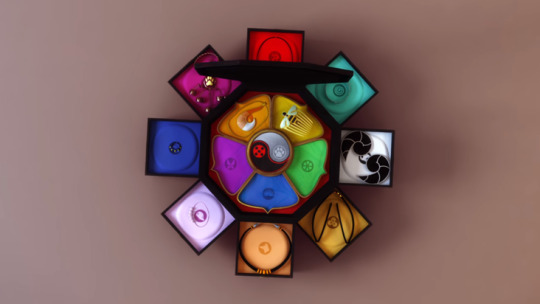
Camouflage
I have to give credit where it's due because the idea of camouflage and shapeshifting for Miraculouses is brilliant. It seems like Miraculous can't fundamentally change its type of jewellery or accessory. The ring will always be the ring but with a different ornament, colour or shape. This is true most of the time (Monkey Miraculous is an exception since it transformed into earplugs/headphones/headband/circlet) It makes sense and avoids plotholes. Grimoire doesn't have the pictures of each Miraculous in disguise for identity protection. That was very neat too. I have no comments. This concept was very good.
Also, since Marinette wore a nose ring of the Ox in "Kwamibuster" without any problem and Adrien wore Ladybug's earrings in "Reflekdoll", we can assume that you don't need to have piercings to wear a Miraculous. Miraculous just magically passes through your skin.
I'm interested to know the following. Can Kwamis recognise a camouflaged Miraculous on a person? Can the holder order them to confess the identity of this person? This shouldn't be possible for identity protection just like with Kwamis sensing each other. But more on that in later posts.
Power Levels
For a long time, we assume that there are only 7 Miraculouses. Turtle belongs to Master Fu, Gabriel has Butterfly and Peacock, Marinette and Adrien have Ladybug and Black Cat. Everything is pretty straightforward. Then it's revealed that there are more jewels and more boxes. It makes the worldbuilding interesting, but it also majorly complicates things, making them inconsistent.
Their position in the Miracle Box implies their power levels. Creation and destruction are the most powerful forces in existence, therefore they are at the top. Moreover, it makes this Box the most important, the most powerful out of all others. Su Han in "Furious Fu" calls it "Mother Miracle Box". Fox, Turtle, Bee, Butterfly and Peacock have less power than the main pair, but more than the Miraculous of the lower Zodiac tier (since they correspond with animals of the Chinese Zodiac).
1. Ladybug can create anything out of nothing (Lucky Charm, which gives what you need the most at the moment). This Miraculous can resurrect the dead, reverse the effects of the Cataclysm. The power of Miraculous Cure or Miraculous Ladybug can work in several ways:
it simply repairs the damage (puts stuff back together, heals injuries and so on)
it reverses time for the matter, restoring things back to the state they were before the destruction occurred (however, the Cure doesn't erase people's memories of everything that happened unless they were mind-controlled, frozen in place or transformed by Akuma into something else - this is an important point that I'll discuss some other time)
How does Miraculous Cure work when there are no supervillians? In NY Special Marinette just says this.

Excuse me, what? What was that? You can't do anything when the villain is gone? What the hell?
*insert here every scene where Ladybug fixed Paris after destroying akumatized/amokized object (this action causes the Akuma victim to detransform/sentimonster to disappear - villain is gone) and purifying butterfly and feather*
It was such cheap angst. I couldn't even be upset when Adrien gave up his Miraculous, because that whole situation is just stupid. But, never mind. We aren't talking about that today.
Apparently, Lucky Charm and Miraculous Cure only work when summoned to battle a specific villain. What is the point then? Huh? You can't tell me that Ladybug has the power of unlimited creation and then say that she can't repair the damage without a special Lucky Charm that was magically synchronised with specific big bad of the week.
Ladybug also can purify Akumas. It makes sense for Ladybug to have the ability to reverse the magic of less powerful Miraculous. But this power can't be applied universally. How does this power of reversal apply to different situations where there is no evil Butterfly holder? Can Ladybug reverse the magic of any Miraculous?
The unlimited power of creation introduced in season 4 ("Mr. Pidgeon 72") is another fascinating thing. On one hand, it's logical and proves the status of this Miraculous as the most powerful. On the other hand, by introducing this power, you have created a plothole. Look, Marinette can create the charm which repels Akumas. If Ladybug can create anything then what stops her from creating a tool for finding Hawkmoth (like special glasses for discovering identities or a compass)? I mean, the show says that the power of creation is unlimited, it means that the creation of such tool is possible.
2. Black Cat can destroy anything with Cataclysm, even other Miraculous. He can kill living things and turn them into ash, but not himself. This Miraculous is supposed to have other special abilities that we don't see. And they should be equal to powers of Ladybug, both in number and in potency. Unfortunately, after 3 seasons writers didn't give us anything. It makes laughable the idea of balance between Ladybug and Black Cat.
Now, to the second tier. These Miraculouses have a singular ability, but they need a second one to keep the power balanced between Zodiac and the main pair.
3. Butterfly creates champions with different superpowers. But how does the time limit of children work for Butterfly? In theory, the countdown should start right after the creation of the Akuma since for Ladybug and Chat Noir countdown starts after activation of their powers even if they don't use them. However, if the countdown of the Butterfly begins after Akuma creation then there's no point because the holder has to stay transformed to guide their champion. The charged butterfly won't have time to even grant powers before the transformation of the child-holder drops. This issue is never explored because Gabriel doesn't have a time limit. However, I feel like it should be addressed in flashbacks of past Butterfly holders for example.
This Miraculous should be less powerful than Ladybug and Black Cat. It's often not. Some Akumas are too overpowered. Stormy Weather can move the Earth away from the Sun, Timetagger can send people through time and jump through time as well, Chat Blanc destroyed the world with a single energy blast, Miraculer could steal powers of those more powerful than her by default. These are the most notable examples. One could argue that Chat Blanc was a different case. Hawkmoth simply gave the most powerful Miraculous a boost. However, we know that even without a holder (the wildest and the most powerful form of uncontrolled Miraculous magic) Plagg's Cataclysm can't destroy the universe just like that (he presumably wiped out dinosaurs and sunk Atlantis on his own without a holder). I think that the less powerful Miraculous (Butterfly) shouldn't be able to increase the power of destruction to such a degree and give Black Cat the power to destroy celestial bodies and galaxies.
Writers want us to see Hawkmoth as the formidable villain. But it's not easy because he is less powerful than your main heroes by default of your worldbuilding. Sometimes writers make the Butterfly more powerful than creation and destruction to raise the stakes, breaking the laws of their magic system. So, how do you solve this? Let Ladybug and Black Cat keep their status as the most powerful and instead of giving Hawkmoth more magical power, make him smarter, more cunning, inventive. Gabriel is a fashion designer, whose creativity makes him a very good Butterfly holder. He has a life full of experience, he knows much more about things than the main teenage characters. Catalyst was very interesting for this very reason. Gabriel sort of discovered a cheat code to boost his powers. Show us how he experiments with his powers, how he analyses his past Akumas and tries to find the most effective ones. Maybe Gabriel tries to design Akumas that can specifically neutralise Ladybug and Chat Noir. This exploration could also give writers an opportunity to explain how the powers of Butterfly work. Can he control the type of powers he grants? Can he control the appearance of Akumas? There are many things to be explored.
4. Peacock creates sentimonsters. I remember that fans were very disappointed when the power of the Peacock was revealed at the end of season 2. I was one of them. The concept of Amoks is far too similar to akumatized butterflies. Other Miraculouses have unique abilities and keywords for their powers, while Peacock just looks like Butterfly 2.0. That glowing mask effect just adds insult to injury.
You have to start by figuring out the powers of the Peacock in a normal situation. If a holder is a good person, then how does their power work? For example, make them related to sight (because of the "eye" pattern on feathers). Maybe, Peacock grants the ability to see the several possibilities of the future, but only a few minutes ahead. Maybe, this Miraculous gives you the ability to see through someone's eyes for a few minutes (and the victim is completely unaware of the intrusion). Perhaps, Peacock allows the holder to use feathers (or tiny peacocks) as cameras one at a time and be all-seeing. These feather-spies can be destroyed by the holder or disappear on their own after some time. Such power could be devastating when used against heroes in canon.
5. Bee can paralyze. This power is pretty straightforward. Once I read a fanfiction focused on very vell done Chloe Redemption, where she fights alongside Ladybug and Chat Noir. Eventually, she grows and becomes a better person. This fic ends with an Akuma battle, where LB and CN are trapped and Akuma is ready to kill them. But Chloe uses a second power of the Bee on the villain - Miraculous Stinger. It's deadly both for the holder and for the victim (because bees die when they sting someone). Chloe kills the Akuma with a Stinger before it can get LB and CN, but she too dies making the ultimate irreversible sacrifice. I will add a link if I find it again.
6. Turtle can create a shield. I don't have much to say on this either. It feels underpowered compared to others in the second tier. Maybe Turtle can also slow down opponents (because turtles aren't the fasters animals out there).
7. Fox creates illusions and acts as their puppeteer. In order to create a balance between other powers, these illusions must hold for as long as the holder needs them to. I propose this mostly because we see that Venom of the Bee lasts very long, the shield of the Turtle lasts either until it's destroyed or the holder wants to remove it, same goes for Akumas and sentimonsters who disappear only when the holder wants them to or their affected object is destroyed.
Let's talk about Zodiac tier. Miraculous of the third tier shouldn't have the second ability like more powerful ones. These powers are the most inconsistent. Even if we haven't seen all of them yet.
8. Mouse can create many small clones of the holder. It is unclear how these clones communicate with each other and how many of them this Miraculous can create. The holder can control the number of clones. This power was very convenient in "Kwamibuster" and it makes sense symbolically for the mouse. What activates the time-limit for children? Marinette didn't have any problems with it when she became Multimouse.
9. Snake can create a 5-minute time loop and has the ability to come back in time. This Miraculous feels a bit overpowered for the Miraculous of the Zodiac Tier. The holder can reset the time as many times as he/she needs to. It's was a good source of drama and trauma in "Desperada". I was honestly surprised that Adrien was capable of fighting after spending months in a loop. But this doesn't change the fact that Snake is overpowered. You can give this Miraculous the power to hypnotise or keep the time ability but place a limit on the number of resets. How does the lyre work as a weapon? Who knows? No one!
10. Dragon can shapeshift into elements: water, wind and lightning. It has the coolest transformation words hands down (Bring the Storm and Open Sky). Apparently this Miraculous doesn't have the time limit.
11. Rabbit can time travel or jump through alternative realities, even writers aren't sure. Time-travel in this show is so badly written it gives me a headache. This Miraculous shouldn't exist just like its powers. Snake belongs to the same tier, but 5 minutes and whole centuries of time jumps aren't comparable in power levels. They are not and this is the hill I will die on. Give the Rabbit powers related to its symbolism in China like an ability to de-age people, heal them or give them a speed boost in contrast with Turtle who might have the ability to slow down.
This Miraculous is so special that its Kwami - Fluff can live separately from his Miraculous in a Miracle Box for millennia (Fluff lives in the Box in "Sandboy", but his Miraculous, pocket watch, was passed down for generations in Alix's family). This is a discussion for a separate post, however. There's a lot to unpack. We'll do that some other time. You will suffer with me but at a later date.
12. Horse can create portals. They could lead anywhere, which is pretty cool. On the other hand, this power is not very useful in direct combat, especially when it's used by a child since we can have only one portal per transformation.
13. Monkey can cause a malfunction in powers of other people. What is the point of this? This power was specifically created by writers to defeat Akuma in "Party Crasher". That's it. What if your target is not magical? How does this Miraculous work in different circumstances?
14. Pig shows people their greatest desire. Both the holder and the recipient of this power can see this desire. Chat Noir wasn't impressed in "Guiltrip" and neither was I. It's underpowered compared to other Miraculous in this tier. Also, why does the tambourine can shoot energy beams? Why?
That's all I have to say on the matter. I'll update the power analysis as needed.
#miraculous ladybug#ml#miraculous analysis#miraculous meta#ml meta#ml analysis#miraculous transformations#miraculous critical#miraculous ladybug critical#miraculoustalesofladybugandcatnoir#mt of lb and cn#miraculous jewels
47 notes
·
View notes
Text
Season 4 of Miraculous came out!
Miraculous Ladybug is back and I am curious to see whether the writing has improved because Season 3 characterisation and plot left me frustrated and wondering what the hell is going on? A lot of episodes in Season 2 were messy and in Season 3 everything escalated, somehow becoming even worse in a lot of places.
So, expect me to write you some meta and analysis in the following weeks when I can find the time. I'm a PhD student, time is of essence. I don't have a lot of opportunities to write for fun right now, unfortunately.
9 notes
·
View notes
Text
Native English Speakers VS Everyone else
Native English speakers just don't understand and will never understand the constant struggle of those who learn it as their second language and how freaking expensive it is.
Do you want a well-paying job in an English speaking country? Do you want to study in school or university there? Do you want to take some kind of courses there? You must have a language certificate, mate. Oh, and it must be no older than 2 years. TOEFL and IELTS are valid only for 2 years and are expensive. Cambridge English exams don't have an expiration date, but they are even more expensive.
Do you want to prepare for those exams? Please buy an official preparation package of textbooks and CD's, plus add some practice tests into the cart. Don't forget to pay for a tutor and find yourself a speaking partner.
Did you fail your exam? Please, register and pay for it once more.
Does your town has a certified exam centre? If not, you must travel to another city and book a hotel for 1 night.
And sometimes it's frustrating, I'm not going to lie. If you don't know English, you've already lost in life before the game can truly begin. English learning is such a well-oiled money-making machine. And I don't think that most people, especially Native English speakers, understand that.
1 note
·
View note
Text

My sister is a genius! Check this out! It's one of her university works for art class 😍
#art#artists on tumblr#watercolour#watercolour art#sibling love#my sister is amazing#art in architecture school
1 note
·
View note
Text
South Korean music industry at a glance: an outsider perspective
I watched one particular AMV last week. The song used for the video was “I’m afraid” by Korean rock band DAY6. I was pleasantly surprised as someone who values lyrics in song first and foremost. The music itself was great. I’ll listen to their songs again. It’s a nice fit for my music taste. Naturally, YouTube’s algorithm decided that I’m a fan of everything Korean after 1 video and started spamming my recommendations with k-pop songs, documentaries and everything in-between.
I watched a couple of videos, listened to some songs and discovered fascinating patterns. So, I went down to the comment section. And it was rather interesting experience, should I say? The concept of entertainment industry in South Korea simply begged to be explored more after this. I dug deeper and visited Tumblr k-pop tags and briefly glanced upon Instagram and Twitter. And, oh...
I am a big picture person and I enjoy both studying and creating systems. This one was particularly fun to explore. I discovered a lot of new things for myself. Perhaps, you can discover something new for yourself too or take a step back and look at this from a new angle.
Disclaimer: it’s impossible not to offend someone on Tumblr, so keep that in mind. That being said, I do NOT intend to insult of offend anyone. It’s just a little research done for fun, because I love research with a purpose. This post is NOT A HATE post. No hate intended for fans, artists or other people involved. It’s meant to be a discussion, nothing more and nothing less. If it sounds like hate, it’s just my sarcastic sense of humour.
Content Warning: I mention suicide, death, depression, rape in a couple of sentences. There’s nothing major or graphic, but it’s there.
In this long post I decided to share with you my opinion, a so-called outsider perspective, on the world of music entertainment industry in South Korea and people involved in it on different levels. I use the word “outsider” mainly because, that’s exactly what I am in this case, as someone who is in no way involved in k-pop community. I can’t name you a single band or their members. I don’t know any solo artist and can’t neither sing nor name you any song.
And to be completely honest, I don’t think I will set my foot into k-pop fan-circles ever again after everything I saw.
Think of this as “In this essay I will...” meme, except there’s an actual essay.
As far as I know, in South Korea “k-pop” refers to all music produced in SK, including solo artists, various bands, singers-songwriters. It doesn’t even have to be pop music. Koreans include in this definition all genres of music. However, around the world “k-pop” means primarily music made by idol groups and bands marketed for children, teenagers and younger people. In this post I use the latter definition, because that’s how most people understand “k-pop” in other countries. Therefore, my statements, opinions and conclusions here would concern only idol music.
The music industry in South Korea is heavily influenced by culture and traditions of the country, just like all things are. And there’s nothing wrong with that. After all, different backgrounds are what makes people so interesting and unique. However, when combined with consumer mindset, desire to generate profit at any cost and fast-paced nature of modern life these neutral cultural elements could produce something concerning, and it can lead to disastrous consequences.
1. Idol
These people are called artists, musicians, singers, bands, groups, performers. In South Korea and in Japan, however, people call them Idols or Stars. I’ve also seen Muses, Princes and Queens. Interesting, isn’t it? The terminology used to describe these musicians in South Korea is one of the key elements in this whole entertainment system. You’ll see why.
But who or what is an idol exactly? Let’s take a basic definition from Wikipedia.
“In the practice of religion, a cult image or devotional image is a human-made object that is venerated or worshipped for the deity, person, spirit or daemon ... that it embodies or represents. In several traditions, including the ancient religions of Egypt, Greece and Rome, and modern Hinduism, cult images in a temple may undergo a daily routine of being washed, dressed, and having food left for them. Processions outside the temple on special feast days are often a feature. Religious images cover a wider range of all types of images made with a religious purpose, subject, or connection. In many contexts "cult image" specifically means the most important image in a temple, kept in an inner space, as opposed to what may be many other images decorating the temple.
The term idol is often synonymous with worship cult image. In cultures where idolatry is not viewed negatively, the word idol is not generally seen as pejorative, such as in Indian English.”
Cambridge Dictionary defines idol as follows:
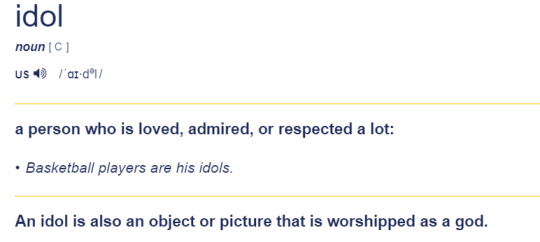
And here’s the definition from Oxford Dictionary:
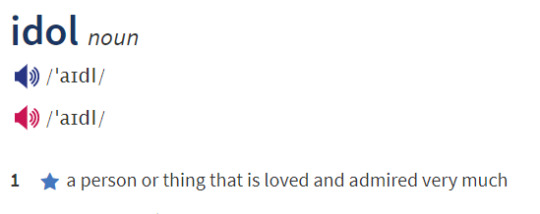
This is a centrepiece of this tapestry. Surely, you have noticed by now what these definitions have in common.
Idol = a cult image of a god, a deity
By calling these musicians “idols” industry makes society and audience treat them in certain way, namely as gods. What characteristics do gods possess? They are beautiful, talented, funny, confident and graceful, blessed by eternal youth of immortality. Gods have no flaws, they do not bleed, they are above human concerns. They are an embodiment of perfection. They are stars, you could not reach.
But real people are not like that. They can be sad and angry, insecure. People don’t have perfectly symmetrical faces. They can’t dance in sync without preparation. They can’t sing like angels at any given moment throughout the day.
What happens when idols accidentally reveal their humanity? What happens when people see, that they make mistakes and do stupid things, that they need to train hard to appear graceful on stage?
I will tell you. And it’s not pretty. But, first, let’s look at other elements of this system.
2. Y/N and Self-insert fantasy
Aside from the music, K-pop sells the self-insert fantasy to the audience. It’s carefully arranged to appear real, where the cracks are masked and every word is scripted. The reality is so vivid that one doesn’t even have to use imagination all that much, because all scenarios and decorations already exist. Countless interviews for TV and magazines, fan meetings, talk shows, reality shows made sure people are privy to all juicy details of personal lives and opinions of musicians. And also one word - merchandise. Some of that merch made me question my life choices. Some of it is, ah, creepy or has weird vibes. All of this provides plenty of material for people to work with. Fans can effortlessly imagine themselves beside their idols or even in their place.
In a highly competitive society, where people throw themselves into studying and work since young age, forming deep and lasting connections with others is very hard, sometimes impossible. As a result, people long to have a group of close friends with similar interests, a loving partner who would cherish them endlessly. People want to be rewarded for their backbreaking efforts to succeed by the carefree life of fame and music, everlasting friendships and love. And in a way you can’t really blame them for his.
Does this dream life sound familiar? We are looking at K-pop bands here. It doesn’t really matter if their members don’t always get along or that they can live in debt, that fame is fickle and adoring fans can tear your self-confidence to shreds. Audience wants the glamour of fantasy and the industry is more than happy to cater to these desires.
Perhaps, knowing that even for idols this fantasy is sometimes unattainable makes the whole set up feel just a little cruel.
3. Fans, stans and fandom culture
We’ve already established earlier that idols are gods in the eyes of people and listed traits they must possess. So, what else do gods need to exist? Worshippers. Because a cult is worth nothing without its followers. Gods need a group of people to worship them and spread their beliefs. The role of worshippers is performed by a fans in this case.
Apparently, there is a running joke that girl groups need to win a general public popularity and boy bands need a big passionate fandom. It seems to be true according to my observations.
In k-pop fandom people use the word “stan” to state that they like or support particular group. Now, I am sure everyone here knows that in other fandoms, dedicated to movies, shows, books and games there’s an important distinction between being a “fan” and a “stan”. What is it?
A fan is someone who likes a ship or character, creates and/or consumes fandom content, supports certain ideas, discusses things they enjoyed and disliked, criticises canon. Stans, however, are a different breed. They engage in all typical fandom activities, but their support and enjoyment becomes obsession. Stans believe their favourite characters and ships are immune to criticism, that they are superior no matter what others say. Stans start shipping wars, send anon hate, death threats over fictional characters and hurt real people. Stans are considered toxic fans. And majority of normal civilised people don’t like them and try their best to let stans hang out in their echo chamber by themselves.
In other fandoms and communities, to be a fan means to love, support and enjoy something, while to stan means to obsess over and hyperfixate on these same things. Words “I stan” rarely mean “I support” for most people, and if they do mean that, it’s only used in a joking manner (”We stan procrastination legend!”, “I stan our miscommunication kings”).
Everywhere else “stan” has only negative connotations, except in k-pop. But what has changed? What’s the difference? Why do international fans scoff at “shipper stans” and then turn around calling themselves “stans of X k-pop group” at the same time? Does it make you wonder?
And this is another core theme of k-pop, in my opinion. In fandom where stan = obsession = support, you can see interesting patterns.
Fandom loves their flawless gods. But watching them from afar is not enough for some people, because unlike deities in different religions, these gods live among us. People are very much aware of that. Industry has created a cult and laid the groundwork for worshippers to express their adoration in every way including personal contact. And who wouldn’t want to meet their god? Who wouldn’t want to know more about them or tell them how much you love them? In talk shows and fan meetings there is only so much one can do after all.
People desire to know more, to have more so much that their obsession transforms into concerning stalker tendencies. These crazy individuals follow idols, stalk them on social media, in hotels, research flight numbers, bribe security. Musicians were attacked and poisoned. I strongly suspect there were cases of rape that no one knows about. There is even a special term for these fans - “sasaeng”.
Is there a definition for stalkers of actors or musicians in western world? No, I’m pretty sure there isn’t. They are just called “invasive/obsessive fans” or “stalkers”.
Also, there are sasaeng memes. Yeah, you heard that right. I enjoy some classy dark humour as much as the next person, but there is a fine line between normal and questionable.
Back to the topic of stalkers. Do you realise how disturbing that is? Such behaviour is so common that there is a term for it. You create a fandom-cult, encourage people to worship k-pop idols as gods and then act surprised when members of said cult become fanatics and their adoration becomes obsession.
And it’s so easy to step on this slippery road. The system makes it ridiculously easy. Lines begin to blur. How much is too much? Where do you draw the line?
While sasaeng fans engage in extreme real-life obsession, people online aren’t that far off, to be honest. I’ve seen it all: imagines, headcanons, fanfiction, real-person shipping, reactions. Real person shipping is a controversial topic. Some people support it, others don’t. I suppose I’m among those who don’t get it. I’m not exactly against it, but I find it strange. Mainly because it’s based on assumptions made by fans about personalities and behaviour of real people.
Assumptions. Dear me! K-pop fandom has this thing with video compilations. I’ve never seen this phenomenon being so widespread in any other community or fandom. Basically people edit together a collection of short clips from talk-shows, interviews, Instagram stories, some YouTube videos, etc and then proceed to analyse every gesture, word, facial expression of idols and provide both audio and on-screen commentary. These videos and many other forms of similar analysis allow people to imagine what kind of personalities idols have, what kind of life do they live. It’s the source material for fanfiction, imagines and headcanons.
But it’s not real. It’ll never be real. It’s an illusion, an image, a stage persona. They fall in love with a face and made up personality. And I think that when people create this content they can forget this. Fans can develop certain emotional dependence and unhealthy attitudes in the long run. In some YouTube comments even supportive and encouraging words sound whiny and obsessive. And semantics of being a “stan” of certain group or individual doesn’t help.
4. Industry, companies and liars
At last we arrive at the most important aspect of music entertainment industry - its creators.
Have you seen “The Road to El Dorado”? It’s one of my all time favourites. It has iconic characters, adult jokes that I didn’t get as a child and iconic soundtrack. I’ll quote “It’s Tough To Be A God” a lot here.
In South Korea music industry is a factory, the production line to be exact. This kind of set up affects everything in the grand scheme of things. Companies and agencies play the role of training centres and record labels. And there are so many of them that a whole new scamming system developed based around fake idol agencies. It implies that there are people who fall for offers of these agencies and continue to do so. I suspect that victims must pay a fortune upfront before they realise their mistake. Are there any kind of legal protection against such scams? How can people verify the authenticity? Because a well masked scam can exist for a long time before someone discovers it and calls them out on their nonsense.
As far as I understand legal companies work like this. After high school, which is often focused on performing arts (and private schools can get away with using talents of students for personal gain, which is totally not surprising), young people can audition for an agency and become an idol in training or idol-trainee. And passing audition is hard. But good recommendations can help, connections too.
During training you don’t get paid. Only a few companies pay aspiring musicians. People can spend years in training and don’t debut. But rent, necessities, clothing and food (not that you need much of it, but more on that later) cost a lot. Where do you get the money to live then? Support from parents, one or two part time jobs at most and bank loans. Surprise! We found an unexpected (just kidding, it’s very obvious) party, who reaps benefits from the system.
You need skill to be an idol. Natural talent helps too. The more skills you have, the cheaper and faster your training is. To level up your game you attend classes every month offered by your agency, which are not cheap (dance classes range from 400$ to 1000$ per month, sometimes more). There are four main categories in evaluation process: vocals, rapping, dancing and visuals. Idols are multitaskers, to have a chance on stage one must be perfect at everything. And people are ready to invest thousands of dollars into their kids training so that they could have a chance in entertainment industry. South Korea thrives on revenue k-pop industry generates every day.
Let’s pause here for a second and think about what kind of people come to these agencies. The answer is easy. People who have a dream, a desire, a real goal. You don’t wake up one day and decide to become a k-pop idol. Sometimes people get invited by agencies (after prior acting, modelling career or any other form of exposure). These people are usually very young. Some start straight after high school, some after university, but 25 years old is considered a late start. Compare that to western musicians who start singing at any age and still become famous.
But why this age limit? Because idols are eternally young. So that in public eye musicians are remembered as 20 year old gods. People would listen to their music and imagine a young attractive face. Career in k-pop is short, it lasts 5-7 years, rarely longer than that. It’s even less than modelling or acting can offer. And professional sportsmen retire in their late 30′s. Some play longer, but usually, that’s it.
If you live in Los Angeles and say that you want to be an actor or performer, no one would bat an eye. It’s like saying that you want to be an engineer or accountant. Similarly, in South Korea becoming an k-pop musician is a real career. Because part of the self insert fantasy that the industry sells is the idea that anyone can be an idol. It’s easy after all. Anyone can pass auditions and become a trainee. A trainee with no guarantee of debut. But one should never underestimate the power of idol-dream. After all, idea is the most resilient parasite.
“My friends started training in kindergarten. They have wanted to become idols since young”
“A lot of young kids get interested in Korean music”
A 6-year old child sees the performance of k-pop group for the first time on TV. Let’s say it’s a girl. She is enraptured and decides that she will be like that too someday. She grows up, while being part of the fandom, just like all idols are in one way or another and whose fan-obsession transforms into desire to succeed. Her parents spend time and money to find her tutors, to fund dancing and singing classes. Perhaps in high school this girl decides to fix the shape of her eyes and make nose straighter. She trains hard and passes the auditions in her dream agency. And during training this girl faces the reality of behind the scenes life in music industry.
“Why are you crying? I’m not even pushing you”
“How many times have I told you? The rest are doing it perfectly”
“She is dancing like an elementary school student“
“I watched your performance as a spectator who bought a ticket to your concert. I want a refund“
“You make my ears hurt. I don’t want to listen at all”
“Listening to you was tiring”
“I’ll kick you out instead. You won’t debut”
“I thought I was going to die. That’s how determined I was”
While I do understand that keeping a high quality standards in media industry is important, there are more productive and healthy ways to motivate someone to improve and be more passionate, you know? Constantly insulting people with sadistic glee and putting them down at every opportunity or calling them ugly to their face doesn’t do much.
Do you think that children know about this? Do they know about soulless teachers and belittling managers? Do they know about friends who are really your competition, so you shouldn’t get attached? Do they know about living in debt? Do they know any of this? No, I don’t think they do.
Children dream about the stage, about the sea of lights and crowds who chant your names. They want adoring fans and photoshoots. They want to appear on TV and magazine covers. Teenagers want the thrill of performance, they want to share their music and dancing with others.
“I don’t know how many times I cried alone”
The truth is cruel. But they won’t give up easily even if it means sleeping 4-5 hours and consuming no more than 500 calories per day. Because giving up means that your whole life was a lie. One can’t afford not to be good enough. Giving up means admitting that all efforts and money your family invested into your dream were in vain. It means losing face before your family and friends - a fate worse than death. Imagine living this idol dream and building your whole future around it and then being told that you’ll never debut because of the circumstances outside of your control or something minor, like face shape or 1 kg of weight that your body refuses to lose. It can break you. Especially if you are like 18 or something.
5. “And who am I to bridle if I'm forced to be an idol
If they say that I'm a God, that's what I am”
“I don’t think there’s anything a tough as being a trainee in Korea”
Once you are a trainee at the agency your personal life does not belong to you anymore. You can’t go out without permission of the agency. You phone is taken away. Your diet and weight are monitored. Bad habits are not allowed (no smoking, drinking or drugs). Oh! I think I found the good thing in the system! Unfortunately, it won’t last. Trainees can’t date or meet with family without permission of agency. Dating is very taboo. Even established idols can’t openly date.
Why is that? Because gods can’t belong to anyone. Their lives are property of the fandom. Because openly dating idols destroy the self-insert fantasy. There was a former idol girl who dated another musician. She was called a whore by her fans, her loving and adoring stans. You might know who I am talking about. Would you call an American actor or singer a prostitute for dating someone?
Trainees sign the contract. And how can a young person straight out of school or university know much about what makes a good contract in entertainment industry or what makes a good contract in general? Even if you do understand the terms fully you would still sign it because if you have come so far, you can’t let your dream slip this easily. There isn’t a choice. Not really. If you want to debut, you will agree to anything.
What about life after debut? You have to pay off your loans. And company takes 60-70% of your group’s earnings. Artists themselves get 30-40% and split it between themselves. K-pop groups have from 5 to 10 members or more than that. Each person gets less than 6%. Idols are not filthy rich. They are not. These earnings are practically nothing compared to the work you have put into this.
Idols are musicians, who often don’t even write their own songs, music or create choreography. But if public doesn’t like the song and musical number the company created, they blame idols for the failure. Such an amazing logic we see right here. But people say that sharing music is the best part of idol life. But whose music?
Models on catwalk are not there to demonstrate their physical beauty, they are blank canvas for works of clothing designers. Same with k-pop musicians. They act like puppets in a way, whose faces and voices are used to show audience someone’s music and songs. Some groups do write their own music and lyrics and it’s nice to know that. But those, who don’t are rather unfortunate. It’s a nice tool of psychological control and pressure for an agency. They can hold it over group and use the following rhetoric: “We gave you everything! Why can’t you follow the simple instructions” or “Where would you be without us? It’s not even your music!”
I called k-pop industry a factory. That’s true. Dozens of people become trainees every year. These talented young people are fully prepared to do anything to achieve their goal. They are ready to practice until they collapse, starve themselves and pour themselves into every song. Companies know that. Tell me why would they value their idols as individuals, as people, as human beings if they always have a replacement? Why bother with mental health of their artists if next year they could have a fresh set of people, who are younger and prettier? Why try to improve relationships inside groups if you could fire any member and replace them within a month or two?
In western countries famous bands have different stories. Some were friends since high school, who played in bars and during festivals and then they were noticed by some representative of label company, who offered them a contract. Some groups were formed by like-minded people who bonded and decided to share their music with the world. There are many stories, but ultimately the have one thing in common. Bands in the West often form themselves. These people had time to bond, connect, discover each other, solve some disagreements and learn to work around their differences.
K-pop groups are formed by their agencies. They are their property in a way. Company selects the best and puts together these total strangers, appoints the leader with marketable face and personality and then expects them to work together like a well-oiled machine. No one has time to bond during training, because other people are you competition, not friends. And then you must learn to work as a team and be best friends on camera for the audience to support the self-insert fantasy. It’s no wonder that k-pop groups don’t get along sometimes. And every member knows that they are replaceable. It doesn’t help in forming connections. Groups can’t just terminate contract and go to work with another agency. I heard it happens sometimes, but it’s not a done thing. Unlike in other countries where bands just sign the deal with a different label and release their music under their name if they don’t like the old conditions.
“It's tough to be a God
But if you get the people's nod
Count your blessings, keep them sweet, that's our advice
Be a symbol of perfection
Be a legend, be a cult
Take their praise, take a collection
As the multitudes exalt
Don a supernatural habit
We'd be crazy not to grab it
So sign up two new Gods for paradise”
But is it really a paradise?
Idols are expected to act cute, to match personalities created for them by fans or media. They have to act according to the concept of their group. They have to be a symbol of perfection: skinny, single and with a face perfected by surgery. They are allowed to mess up, but only in a cute way. They can break down and cry, but only if it’s “aesthetic”.
Weight issues are a separate topic. Sometimes I wonder whether managers in companies understand how weight loss or human body in general works. To be honest, I think that scales in agencies are rigged. And only managers know that. I know it can be done from personal experience. Some beach resorts tweak their scales and make them show 4-6 kg less than actual weight, so people wouldn’t get upset if they gain some. There is no way a girl as tall as I am (173 cm) could weigh like 47-50 kg and be able to perform complex choreography on stage and sing without being out of breath, visit the gym on a regular basis and generally function as a normal human without fainting every other day.
“I developed a lot of eating disorders”
“I think I consumed about 300 calories today“
“Someone, please, trim the fat off her arms”
If you grow up thinking of idols as gods and then, when you become one of them you think that you must act as one too. But being an easily replaceable god is a heavy burden. The industry, companies and audience want you to be perfect, to always be on your best behaviour. And the thought of not being good enough or divine enough terrifies you, because stans have no mercy (black ocean concept is the most stupid thing ever by the way). This kind of pressure can destroy even the most resilient. And it does.
Almost everyone knows that situation with mental health in South Korea is not the best to put it lightly. In many ways it’s a cultural thing. But in k-pop mental health issues are treated with even less care. Gods are not supposed to be depressed or suicidal. They are not supposed to have fears or insecurities, can’t be upset or angry. They try hard to be this deity, this image. So, even when they realise they need professional help or even a friend to talk to, they either won’t seek said help or reach out only to be met with silence. Some agencies disapprove or forbid therapy altogether.
Sometimes fandom becomes self-aware.
“Don’t forget that idols are people too!”
“Your favourite idols are running out of breath just to keep you entertained“
“They are humans, who have feelings!”
Oh, but here’s the thing, my friend. The industry doesn’t want you to think of them as people. Companies and media repeatedly reinforce the idea that they are not people, they are your idols. And strangely enough, the audience supports this idea. People continue to call them idols, developing worshiping tendencies in the process, imitate them, scrutinise their flaws and triumphs. Because, you know, only “real and ordinary humans” can have flaws, not “idols”.
So people who say “they are human too” and people who say “wow, this concert was amazing, but vocals in the beginning were so off-key, I simply can’t” are one and the same.
This thought process would have been funny if it wasn’t so disappointing. But that’s just my observation.
And here’s another thing about sexualisation. I said before how appearances are everything, marketable face and body could drastically improve your chances to succeed. Companies know about this too and concepts and aesthetics of groups are designed accordingly. Girls are dressed in skimpy outfits, their dances are unnecessary suggestive, they wear heavy make up and try to have “mature” vibes. Boys don’t avoid such objectification either: suits, tight pants and dress shirts along with make up and hairstyle to give audience a promise of the things to come. Grown adults are not supposed to lust after 15-17 year olds. You can’t just create a sexy stage persona for teenagers. Do you remember my earlier words about creepy merch? Yeah. All of it neatly plays into the self-insert fantasy and encourages obsessive behaviour.
This happens in western countries too. In some way that’s understandable. Beautiful and sexy image with a hint of innocence attracts more people and sells, because it caters to one of the base human instincts. But some things make your skin crawl.
Sponsorships are another topic. Some k-pop bands seek out sponsors to provide financial aid and cover expenses, when earnings are not enough. Sometimes these sponsorships are fine, perfectly civil. But sometimes it’s a prostitution. Girl groups receive money and provide sexual favours to their patrons. It’s a way for the group to gain financial support and even find new opportunities in the industry. Companies can encourage such deals. Let that sink in for a moment.
6. “Any advice to those who want to become a k-pop idol?”
A lot of former idols and trainees have similar responses to this question.
“I don’t want to discourage anyone, but think twice”
“You only see the glamorous side, but don’t see all the hard work that goes into it”
“It’s not what you think”
“They think ‘Since I am good looking and can sing and dance really well, maybe I should become an idol?’, but there is much more to it“
“They think it’s something that is easy and will keep their family set for life financially”
And this implies that most people don’t know what kind of lifestyle k-pop stars truly have, despite the amount of information available online about “behind the scenes” proceedings.
7. Moving on
I am a practical person and every decision I make is subjected to scrutiny. And after seeing everything I can't help but wonder whether idols believe it's truly worth it. What keeps the industry alive is the idol-dream, the wilful ignorance of its reality and youthful idealism, the beautiful naïve belief that it'll get better, even if it never does in the end.
Sure no one would ever admit it out loud, because it's one of those things you never say on camera, no matter how sincere you have to be. It's the matter of professionalism after all, and idols have it spades. And also, because admitting this would equal admitting that you spent your best years doing something you both loved and hated, admitting that this was a mistake.
When you grow up in a society where appearances matter the most, where saving face and being polite is more important than staying true to yourself, where individuality is tolerated only to a certain point, it takes a lot of courage to admit that you need a break. I greatly respect those who decided that idol lifestyle is not for them and moved on.
8. Conclusion
To sum up, I hope you enjoyed my small research and this perspective, since you have read it all the way to the end.
You have noticed that entertainment industry is an intricate system and its every component makes sure nothing changes. Companies have power over idols and audience, fandom has power over idols and their careers, and musicians themselves have fame and their music, but not always the promised fortune or happiness.
It’s important to understand the big picture to draw your own conclusions and encourage positive and heathy attitudes in fandoms. Being open minded and allowing people to make mistakes and live their lives the way they want to is a part of being a decent person. People don’t owe anything to others. Art is about sharing your thoughts and feelings, promoting ideas and spreading beauty. It’s not always about money. And I think that this is what k-pop lacks as an industry. It turned dreams and human need for self-expression into business. Here everything is turned into a product. Everything idols touch can be sold, sometimes literally. Industry created problems, which can’t be solved anymore, because doing so would topple the system. And I find it tragic. Trapped in an endless chase after perfection creators of k-pop forgot that beauty lies in the eye of the beholder.
If you take a look at comment sections and posts on different platforms, what will you see? What kind of things resonate with audience? What makes people laugh and cry? When people start to appreciate the substance?
“Everyone needs to hear this song in their darkest moments”
“Thank you for your music!”
“They always deliver! These guys can’t make a bad song!”
“It inspired me to write again!”
“Their songs brought me and my sister together once again”
“This is what happens when you let groups write their own music - they make incredible things”
“They really are legends of k-pop! I love that they are not afraid to show their inner strength”
“Stay strong! You rock!”
I believe that the answer is quite simple: when it’s real, sincere. It’s all about the message you choose to send to your audience, because only superficial things cause obsession. When you say that the sparkly façade is all that matters, then that’s the only thing people will ever care about. Your audience will never give a damn about the meaning behind dancing, music or lyrics, if you tell them that performance is more important. No one would praise WHAT k-pop idols sing, instead they would prefer wasting breath to criticize HOW they sing or look or move.
I dare the k-pop industry to prove people that it’s not just about looks or perfection, or laser shows, or being a branding machine. Prove to your fans that k-pop artists are also passionate people with big dreams and talent, who love every moment of their job, who live and inspire, who are human just like us and whose humanity is real!
Do it, you cowards!
And now, I’m finished. I can hear the raging crowd of k-pop fandom in the distance, which means it’s time to hide. See you some other time!
6 notes
·
View notes
Text
Guess who is the Master of Architecture at 21? Me!
It’s been two months, but I really don’t care. I spent almost 6 years in university and deserve a break before my PhD in autumn. I just need to get a scholarship, guys, and turn in my thesis earlier than it’s required. No one can stop me from nailing this!
0 notes
Text

Spring is finally here! Here are some blooming apricot trees for good mood)
2 notes
·
View notes
Text
Welcome to my blog!
I am a bit new here, and I hope that we can get along quiсkly. For the record, this is my first post here, because I’ve never had a Tumblr. As a result, I admit to having pretty much zero knowledge about the way Tumblr operates (tags, pages, blacklisting, messaging and other things - yes, I am that oblivious). And I humbly ask you to forgive me for my future missteps in this area.
Unfortunately, I couldn’t promise regular updates during the year, cause I have the real life, where college and work won’t let me spend much time on Tumblr. But I'll try. Thanks for reading my lengthy introduction! Thank you for your support in advance!
P.S. English is not my first language. In fact, I’m still learning, and that’s why I need some feedback from native English speakers. Help me to improve! Also, there is a fun fact about me - since I’ve already mentioned that I am the full-time university student, well, I study architecture. So if you just happened to be an architect, make sure to tell me, and we can be friends.
1 note
·
View note